
- www.mandela.ac.za

Change the world
Development Studies
- Meet Our H.O.D
- School Home Page
- Qualifications Offered
- Postgraduate Diploma in Development Finance
- PG Dip Maritime Studies
- MA by Research
- MPhil Development Finance
- MPhil in Maritime Studies
- MA by Coursework

PhD in Development Finance
- PhD in Development Studies
- Research Themes
- Bachelor of Arts in Development Studies
- Development Studies Events
DOCTOR OF PHILOSOPHY (PHD) (BY RESEARCH) DEVELOPMENT FINANCE: FULL-TIME/PART-TIME
QUALIFICATION CODE: 44100
NQF LEVEL 10; TOTAL NQF CEDITS FOR THE QUALIFICATION: 360
MODULE CODE:EMR600
The General Rules for Doctors' degrees shall apply. Refer also the relevant pages of the General Prospectus.
Admission requirements
- A cognate master’s degree by research only, passed with at least 60% or an equivalent grade that reflects a relevant standard of knowledge in a particular field as well as research competence
- A cognate master’s degree by course work and research, with the treatise or mini-dissertation passed with at least 60% or an equivalent grade. In addition, a pass of at least 60% or an equivalent grade should have been attained for each of the course work modules.
- Candidates who have completed their master’s degree by course work and treatise or mini-dissertation may be required to do and pass an approved research methodology module, at the appropriate level, with at least a 60% or an equivalent grade, should such a module not have been included in their learning programme
- Candidates who have not met all of the criteria as outlined above, may apply for provisional registration for the degree of Doctor of Philosophy (PhD) and will be required to register for and pass, with at least 60% or an equivalent grade, a module or modules as recommended by the HOD for approval by the RTI Committee of the relevant School within the Faculty;
Conditions that apply
- Timeous application is required to allow for a thorough adjudication of applications.
- Applicants, as part of their application, need to present a preliminary proposal outlining the focus and nature of the intended research and a full CV.
- Upon application, candidates, who have not previously studied at Nelson Mandela University, will be required to submit an official, verified transcript of their academic record that, where applicable, includes the syllabus of each module passed in their preceding degree programme together with a copy of the research project, mini-dissertation or treatise.
- The acceptance of an application is subject to the availability of the implied supervisory capacity, both in terms of time and expertise.
International students who have completed previous qualifications in a language other than English must submit proof of English language proficiency reflecting minimum adequate scores as follows:
v IELTS: 6.5 minimum overall score with minimums of 6 in each section;
v TOEFL:
- Paper-based (PBT) – 580 minimum overall score with minimums of 53 in listening, 52 in reading and 59 in structure/written;
- Computer-based (CBT): 237 minimum overall score with minimums of 19 in listening, 19 in reading and 25 in structure/written;
- Internet-based (IBT): 92 minimum overall score with minimums of 18 in listening, 17 in reading, 22 in writing and 22 in speaking.
The programme of study shall extend over a minimum period of two years and a maximum period of six years (General Rule G4.2 applies).
To provide students with the opportunity to conduct research in the field of Development Finance and related subfields at Doctoral level culminating in the preparation and presentation of a thesis.
Learning Outcomes
Student will be able to:
- Delineate appropriate research objectives/aims/hypotheses
- Delimit the scope of the study as evident from the research objectives/aims/hypotheses
- Maintain the focus of the study consistent with the aims and objectives as set out in the research proposal
- Provide an unambiguous title conveying the focus of the study
- Conduct and present a comprehensive and critical review of contemporary, relevant and authoritative scientific sources and theories in the field or related subfields of Development Finance
- Devise, critically evaluate and present a relevant research design and methodology representing a logical progression from the research objectives/aims/hypotheses to the research process
- Use appropriate analytical techniques in order to meet the objectives/aims/hypotheses of the study
- Accurately interpret and discuss the findings that are well substantiated by the results of the analysis
- Present the results coherently and make logical conclusions based on the research results
- Highlight the applications, implications and unique contributions to the field of study
- Make appropriate recommendations and proposals for future research with consideration of the limitations and shortcomings of the study
- Present the thesis in a linguistically and technically appropriate way meeting all prevailing academic requirements
- Prepare and submit an article for publication in the format required by an appropriate accredited journal, based on the research conducted for the thesis.
Core Content
A doctoral thesis that complies with the criteria as set out in Rule G4.8
Thesis – 100%
To be examined by a panel consisting of three examiners.
External examination forms an integral part of the assessment of the thesis.
Pre-Requisites for this Module
Co-Requisites for This Module
Please refer to the Application Procedure page and the link below for application details
http://www.mandela.ac.za/Apply/Admission/How-do-I-apply
Work@Mandela
FindIt@Mandela

Commercial Services@Mandela
Tel: +27 (0) 41 504 1111
Fax: +27 (0) 41 504 2574 / 2731
Email: [email protected]
PO Box 77000, Nelson Mandela University
Gqeberha, 6031, South Africa
Connect@Mandela
- A - Z Index
- Privacy statement

Privacy statement Mail & Portals --> BEE & Tax Certificate PAIA ISPA FAQ Sitemap A - Z Index --> WCMS
Smart. Open. Grounded. Inventive. Read our Ideas Made to Matter.
Which program is right for you?

Through intellectual rigor and experiential learning, this full-time, two-year MBA program develops leaders who make a difference in the world.
A rigorous, hands-on program that prepares adaptive problem solvers for premier finance careers.
A 12-month program focused on applying the tools of modern data science, optimization and machine learning to solve real-world business problems.
Earn your MBA and SM in engineering with this transformative two-year program.
Combine an international MBA with a deep dive into management science. A special opportunity for partner and affiliate schools only.
A doctoral program that produces outstanding scholars who are leading in their fields of research.
Bring a business perspective to your technical and quantitative expertise with a bachelor’s degree in management, business analytics, or finance.
A joint program for mid-career professionals that integrates engineering and systems thinking. Earn your master’s degree in engineering and management.
An interdisciplinary program that combines engineering, management, and design, leading to a master’s degree in engineering and management.
Executive Programs
A full-time MBA program for mid-career leaders eager to dedicate one year of discovery for a lifetime of impact.
This 20-month MBA program equips experienced executives to enhance their impact on their organizations and the world.
Non-degree programs for senior executives and high-potential managers.
A non-degree, customizable program for mid-career professionals.
PhD Program
Program overview.
Now Reading 1 of 4
Rigorous, discipline-based research is the hallmark of the MIT Sloan PhD Program. The program is committed to educating scholars who will lead in their fields of research—those with outstanding intellectual skills who will carry forward productive research on the complex organizational, financial, and technological issues that characterize an increasingly competitive and challenging business world.
Start here.
Learn more about the program, how to apply, and find answers to common questions.
Admissions Events
Check out our event schedule, and learn when you can chat with us in person or online.
Start Your Application
Visit this section to find important admissions deadlines, along with a link to our application.
Click here for answers to many of the most frequently asked questions.
PhD studies at MIT Sloan are intense and individual in nature, demanding a great deal of time, initiative, and discipline from every candidate. But the rewards of such rigor are tremendous: MIT Sloan PhD graduates go on to teach and conduct research at the world's most prestigious universities.
PhD Program curriculum at MIT Sloan is organized under the following three academic areas: Behavior & Policy Sciences; Economics, Finance & Accounting; and Management Science. Our nine research groups correspond with one of the academic areas, as noted below.
MIT Sloan PhD Research Groups
Behavioral & policy sciences.
Economic Sociology
Institute for Work & Employment Research
Organization Studies
Technological Innovation, Entrepreneurship & Strategic Management
Economics, Finance & Accounting
Accounting
Management Science
Information Technology
System Dynamics
Those interested in a PhD in Operations Research should visit the Operations Research Center .

PhD Program Structure
Additional information including coursework and thesis requirements.

MIT Sloan Predoctoral Opportunities
MIT Sloan is eager to provide a diverse group of talented students with early-career exposure to research techniques as well as support in considering research career paths.
Rising Scholars Conference
The fourth annual Rising Scholars Conference on October 25 and 26 gathers diverse PhD students from across the country to present their research.
Now Reading 2 of 4
The goal of the MIT Sloan PhD Program's admissions process is to select a small number of people who are most likely to successfully complete our rigorous and demanding program and then thrive in academic research careers. The admission selection process is highly competitive; we aim for a class size of nineteen students, admitted from a pool of hundreds of applicants.
What We Seek
- Outstanding intellectual ability
- Excellent academic records
- Previous work in disciplines related to the intended area of concentration
- Strong commitment to a career in research
MIT Sloan PhD Program Admissions Requirements Common Questions
Dates and Deadlines
Admissions for 2024 is closed. The next opportunity to apply will be for 2025 admission. The 2025 application will open in September 2024.
More information on program requirements and application components
Students in good academic standing in our program receive a funding package that includes tuition, medical insurance, and a fellowship stipend and/or TA/RA salary. We also provide a new laptop computer and a conference travel/research budget.
Funding Information
Throughout the year, we organize events that give you a chance to learn more about the program and determine if a PhD in Management is right for you.
PhD Program Events
June phd program overview.
During this webinar, you will hear from the PhD Program team and have the chance to ask questions about the application and admissions process.
July PhD Program Overview
August phd program overview, september 12 phd program overview.
Complete PhD Admissions Event Calendar
Unlike formulaic approaches to training scholars, the PhD Program at MIT Sloan allows students to choose their own adventure and develop a unique scholarly identity. This can be daunting, but students are given a wide range of support along the way - most notably having access to world class faculty and coursework both at MIT and in the broader academic community around Boston.
Now Reading 3 of 4

Profiles of our current students
MIT Sloan produces top-notch PhDs in management. Immersed in MIT Sloan's distinctive culture, upcoming graduates are poised to innovate in management research and education. Here are the academic placements for our PhDs graduating in May and September 2024. Our 2024-2025 job market candidates will be posted in early June 2024.
Academic Job Market
Doctoral candidates on the current academic market
Academic Placements
Graduates of the MIT Sloan PhD Program are researching and teaching at top schools around the world.
view recent placements
MIT Sloan Experience
Now Reading 4 of 4
The PhD Program is integral to the research of MIT Sloan's world-class faculty. With a reputation as risk-takers who are unafraid to embrace the unconventional, they are engaged in exciting disciplinary and interdisciplinary research that often includes PhD students as key team members.
Research centers across MIT Sloan and MIT provide a rich setting for collaboration and exploration. In addition to exposure to the faculty, PhD students also learn from one another in a creative, supportive research community.
Throughout MIT Sloan's history, our professors have devised theories and fields of study that have had a profound impact on management theory and practice.
From Douglas McGregor's Theory X/Theory Y distinction to Nobel-recognized breakthroughs in finance by Franco Modigliani and in option pricing by Robert Merton and Myron Scholes, MIT Sloan's faculty have been unmatched innovators.
This legacy of innovative thinking and dedication to research impacts every faculty member and filters down to the students who work beside them.
Faculty Links
- Accounting Faculty
- Economic Sociology Faculty
- Finance Faculty
- Information Technology Faculty
- Institute for Work and Employment Research (IWER) Faculty
- Marketing Faculty
- Organization Studies Faculty
- System Dynamics Faculty
- Technological Innovation, Entrepreneurship, and Strategic Management (TIES) Faculty
Student Research
“MIT Sloan PhD training is a transformative experience. The heart of the process is the student’s transition from being a consumer of knowledge to being a producer of knowledge. This involves learning to ask precise, tractable questions and addressing them with creativity and rigor. Hard work is required, but the reward is the incomparable exhilaration one feels from having solved a puzzle that had bedeviled the sharpest minds in the world!” -Ezra Zuckerman Sivan Alvin J. Siteman (1948) Professor of Entrepreneurship
Sample Dissertation Abstracts - These sample Dissertation Abstracts provide examples of the work that our students have chosen to study while in the MIT Sloan PhD Program.
We believe that our doctoral program is the heart of MIT Sloan's research community and that it develops some of the best management researchers in the world. At our annual Doctoral Research Forum, we celebrate the great research that our doctoral students do, and the research community that supports that development process.
The videos of their presentations below showcase the work of our students and will give you insight into the topics they choose to research in the program.
Attention To Retention: The Informativeness of Insiders’ Decision to Retain Shares
2024 PhD Doctoral Research Forum Winner - Gabriel Voelcker
Watch more MIT Sloan PhD Program Doctoral Forum Videos

Keep Exploring
Ask a question or register your interest
Faculty Directory
Meet our faculty.

About / Departments
Finance Department | PhD Program
Phd program.
Our faculty, ranked #1 worldwide based on publications in top finance journals (ASU Finance Rankings), consists of more than 30 researchers who study all major areas of finance, making it one of the largest finance faculty in the country. Stern’s finance faculty is highly rated in terms of research output, and faculty members sit on the editorial boards of all major finance journals.

The finance department offers an exceptionally large range of courses devoted exclusively to PhD students. Apart from core PhD courses in asset pricing and corporate finance, students can choose from a range of electives such as household finance, macro-finance, and financial intermediation. PhD students also enjoy the benefits of Stern’s economics department, NYU’s economics department in the Graduate School of Arts and Science (GSAS), and the Courant Institute of Mathematics.
Graduates of Stern’s Finance PhD program have been placed at leading research institutions such as Harvard, MIT, Chicago, Stanford, Wharton, Yale, and UCLA.
Holger Mueller , Finance PhD coordinator
More information on the Finance PhD
Download the Finance PhD poster (PDF)
Explore Stern PhD
- Meet with Us
About Stanford GSB
- The Leadership
- Dean’s Updates
- School News & History
- Commencement
- Business, Government & Society
- Centers & Institutes
- Center for Entrepreneurial Studies
- Center for Social Innovation
- Stanford Seed
About the Experience
- Learning at Stanford GSB
- Experiential Learning
- Guest Speakers
- Entrepreneurship
- Social Innovation
- Communication
- Life at Stanford GSB
- Collaborative Environment
- Activities & Organizations
- Student Services
- Housing Options
- International Students
Full-Time Degree Programs
- Why Stanford MBA
- Academic Experience
- Financial Aid
- Why Stanford MSx
- Research Fellows Program
- See All Programs
Non-Degree & Certificate Programs
- Executive Education
- Stanford Executive Program
- Programs for Organizations
- The Difference
- Online Programs
- Stanford LEAD
- Seed Transformation Program
- Aspire Program
- Seed Spark Program
- Faculty Profiles
- Academic Areas
- Awards & Honors
- Conferences
Faculty Research
- Publications
- Working Papers
- Case Studies
Research Hub
- Research Labs & Initiatives
- Business Library
- Data, Analytics & Research Computing
- Behavioral Lab
Research Labs
- Cities, Housing & Society Lab
- Golub Capital Social Impact Lab
Research Initiatives
- Corporate Governance Research Initiative
- Corporations and Society Initiative
- Policy and Innovation Initiative
- Rapid Decarbonization Initiative
- Stanford Latino Entrepreneurship Initiative
- Value Chain Innovation Initiative
- Venture Capital Initiative
- Career & Success
- Climate & Sustainability
- Corporate Governance
- Culture & Society
- Finance & Investing
- Government & Politics
- Leadership & Management
- Markets and Trade
- Operations & Logistics
- Opportunity & Access
- Technology & AI
- Opinion & Analysis
- Email Newsletter
Welcome, Alumni
- Communities
- Digital Communities & Tools
- Regional Chapters
- Women’s Programs
- Identity Chapters
- Find Your Reunion
- Career Resources
- Job Search Resources
- Career & Life Transitions
- Programs & Services
- Career Video Library
- Alumni Education
- Research Resources
- Volunteering
- Alumni News
- Class Notes
- Alumni Voices
- Contact Alumni Relations
- Upcoming Events
Admission Events & Information Sessions
- MBA Program
- MSx Program
- PhD Program
- Alumni Events
- All Other Events
- Requirements
- Requirements: Behavioral
- Requirements: Quantitative
- Requirements: Macro
- Requirements: Micro
- Annual Evaluations
- Field Examination
- Research Activities
- Research Papers
- Dissertation
- Oral Examination
- Current Students
- Entering Class Profile
- Education & CV
- GMAT & GRE
- International Applicants
- Statement of Purpose
- Letters of Recommendation
- Reapplicants
- Application Fee Waiver
- Deadline & Decisions
- Job Market Candidates
- Academic Placements
- Stay in Touch
- Fields of Study
- Student Life
Finance Requirements
I. preparation.
The study of financial economics requires a grasp of several types of basic mathematics. Students must enter with or very quickly acquire knowledge of the concepts and techniques of:
It is strongly advised that students without a strong and recent background in calculus, linear algebra, or statistics come to Stanford in June to take courses to strengthen any weak areas.
Computer programming skills are necessary in coursework (as early as the first quarter of the first year) and in research. If students do not have adequate computer programming skills, they may wish to take a computer programming course before they arrive at Stanford, or take an appropriate Stanford computer science course while here.
II. Course Requirements
All required courses must be taken for a grade (not pass/fail or credit/no credit). Exceptions are made if the required course is offered pass/fail or credit/no credit only. Each course must be passed with a grade of P or B- or better. Substitutions of required courses require approval from the faculty liaison. Waiving a course requirement based on similar doctoral level course completed elsewhere requires the approval of the course instructor, faculty liaison, and the PhD Program Office.
III. Practicum
Students are required to sign up for either a research or teaching practicum each quarter of enrollment. Below is a description of the practicum requirements for Finance students.
During the student’s first year, the student will be assigned each quarter to work with a different faculty member. This assignment will involve mentoring and advising from the faculty member and RA work from the student. The purpose of new assignments each quarter is to give the student exposure to a number of different faculty members.
In subsequent years, the practicum will take the form of a research or teaching mentorship, where the student is expected to provide research or teaching support under the guidance and advice of a faculty member. Faculty assignments here will be made through informal discussions between faculty and students, and may be quarterly, or for the entire year.
For students of all years, one requirement to satisfy the practicum is that students regularly attend the Finance seminar. The only exception to this will be if there is a direct and unavoidable conflict between the seminar and necessary coursework.
IV. Summer Research Papers
All students in all years are expected to complete a research paper over the summer, and present this paper in the Fall quarter. A draft of this research paper should be submitted by the end of September to the field liaison. Students can continue to work on and improve their paper up to their presentation.
For students completing their first year, the summer paper should demonstrate the mastery of a specific area in the literature together with the early development of a research idea in this area. The student will be expected to present this paper to a gathering of three Finance faculty members of the student’s choosing in October.
In all years after the first year, the summer research paper should be a well-developed research paper. (Well-developed does not mean completed – research is always presented as work in progress. Rather, it means that the work shows enough progress and development to merit a seminar presentation.) Students will then present their papers to the overall Finance faculty and PhD student body in scheduled talks over the Fall quarter. Student presentations will typically be 45 minutes, save for job market paper presentations, which will be a full hour and a half.
A passing grade on the paper at the end of the second year is one requirement for admission to candidacy. More generally, these presentations throughout all years will be a primary manner that faculty who are not advising the student become familiar with the student’s work, and will play a crucial role in the assessment of the student’s academic progress.
V. Field Exam
Students take the field exam in the summer after the first year. Material from the field exam will be based on required first year coursework. This includes required finance courses, as well as the required microeconomic and econometric classes. The primary purpose of the exam is to ascertain that students have learned the introductory material that is a necessary foundation for understanding and undertaking research in the field. Additionally, studying for the field exam will give students the opportunity to review and synthesize material across all their different first year courses. Students may be asked to leave the program if they fail the field exam, or may be allowed to retake the exam at the Faculty’s discretion. Students who fail the field exam two times will be required to leave the program.
VI. Teaching Requirement
One quarter of course assistantship or teaching practicum. This requirement must be completed prior to graduation.
VII. Finance Oral Exam
The finance oral exam takes place at the end of the spring quarter of the second year, in early June.
At the beginning of the spring quarter of the second year, the student meets with the liaison to determine three finance faculty members who will administer the exam. The student then meets with the selected faculty examiners to discuss a set of topics that will be covered in the finance oral exam. These topics will generally be chosen from coverage in the Finance PhD classes. An important component of the exam involves the student identifying a particular research area to discuss at the exam. The student will be expected to discuss major results in the literature related to this area and to identify important unresolved questions that need to be addressed. In addition the student will be expected to discuss how one or more of these questions might be addressed either theoretically or empirically. This discussion can be viewed as a preliminary step towards identifying the research project of the second year paper. The results from the finance oral exam plus the result from the second-year summer research paper (presented in the fall of 3rd year) and overall performance in the program are weighed in the decision to admit to candidacy.
VIII. Candidacy
Admission to candidacy for the doctoral degree is a judgment by the faculty of the student’s potential to successfully complete the requirements of the degree program. Students are required to advance to candidacy by September 1 before the start of their fourth year in the program.
IX. University Oral Exam
The university oral examination is a defense of the dissertation work in progress. The student orally presents and defends the thesis work in progress at a stage when it is one-half to two-thirds complete. The oral examination committee tests the student on the theory and methodology underlying the research, the areas of application and portions of the major field to which the research is relevant, and the significance of the dissertation research. Students are required to successfully complete the oral exams by September 1 before the start of their fifth year in the program.
X. Doctoral Dissertation
The doctoral dissertation is expected to be an original contribution to scholarship or scientific knowledge, to exemplify the highest standards of the discipline, and to be of lasting value to the intellectual community. The Finance faculty defer to the student’s Dissertation Reading Committee to provide general guidelines (e.g., number of chapters, length of dissertation) on the dissertation.
Typical Timeline
Years one & two.
- Field Requirements
- Directed Reading & Research
- Advancement to Candidacy
- Formulation of Research Topic
- Annual Evaluation
- Continued Research
Stanford University
Related departments.
- Priorities for the GSB's Future
- See the Current DEI Report
- Supporting Data
- Research & Insights
- Share Your Thoughts
- Search Fund Primer
- Teaching & Curriculum
- Affiliated Faculty
- Faculty Advisors
- Louis W. Foster Resource Center
- Defining Social Innovation
- Impact Compass
- Global Health Innovation Insights
- Faculty Affiliates
- Student Awards & Certificates
- Changemakers
- Dean Jonathan Levin
- Dean Garth Saloner
- Dean Robert Joss
- Dean Michael Spence
- Dean Robert Jaedicke
- Dean Rene McPherson
- Dean Arjay Miller
- Dean Ernest Arbuckle
- Dean Jacob Hugh Jackson
- Dean Willard Hotchkiss
- Faculty in Memoriam
- Stanford GSB Firsts
- Certificate & Award Recipients
- Teaching Approach
- Analysis and Measurement of Impact
- The Corporate Entrepreneur: Startup in a Grown-Up Enterprise
- Data-Driven Impact
- Designing Experiments for Impact
- Digital Business Transformation
- The Founder’s Right Hand
- Marketing for Measurable Change
- Product Management
- Public Policy Lab: Financial Challenges Facing US Cities
- Public Policy Lab: Homelessness in California
- Lab Features
- Curricular Integration
- View From The Top
- Formation of New Ventures
- Managing Growing Enterprises
- Startup Garage
- Explore Beyond the Classroom
- Stanford Venture Studio
- Summer Program
- Workshops & Events
- The Five Lenses of Entrepreneurship
- Leadership Labs
- Executive Challenge
- Arbuckle Leadership Fellows Program
- Selection Process
- Training Schedule
- Time Commitment
- Learning Expectations
- Post-Training Opportunities
- Who Should Apply
- Introductory T-Groups
- Leadership for Society Program
- Certificate
- 2023 Awardees
- 2022 Awardees
- 2021 Awardees
- 2020 Awardees
- 2019 Awardees
- 2018 Awardees
- Social Management Immersion Fund
- Stanford Impact Founder Fellowships and Prizes
- Stanford Impact Leader Prizes
- Social Entrepreneurship
- Stanford GSB Impact Fund
- Economic Development
- Energy & Environment
- Stanford GSB Residences
- Environmental Leadership
- Stanford GSB Artwork
- A Closer Look
- California & the Bay Area
- Voices of Stanford GSB
- Business & Beneficial Technology
- Business & Sustainability
- Business & Free Markets
- Business, Government, and Society Forum
- Get Involved
- Second Year
- Global Experiences
- JD/MBA Joint Degree
- MA Education/MBA Joint Degree
- MD/MBA Dual Degree
- MPP/MBA Joint Degree
- MS Computer Science/MBA Joint Degree
- MS Electrical Engineering/MBA Joint Degree
- MS Environment and Resources (E-IPER)/MBA Joint Degree
- Academic Calendar
- Clubs & Activities
- LGBTQ+ Students
- Military Veterans
- Minorities & People of Color
- Partners & Families
- Students with Disabilities
- Student Support
- Residential Life
- Student Voices
- MBA Alumni Voices
- A Week in the Life
- Career Support
- Employment Outcomes
- Cost of Attendance
- Knight-Hennessy Scholars Program
- Yellow Ribbon Program
- BOLD Fellows Fund
- Application Process
- Loan Forgiveness
- Contact the Financial Aid Office
- Evaluation Criteria
- English Language Proficiency
- Personal Information, Activities & Awards
- Professional Experience
- Optional Short Answer Questions
- Application Fee
- Reapplication
- Deferred Enrollment
- Joint & Dual Degrees
- Event Schedule
- Ambassadors
- New & Noteworthy
- Ask a Question
- See Why Stanford MSx
- Is MSx Right for You?
- MSx Stories
- Leadership Development
- Career Advancement
- Career Change
- How You Will Learn
- Admission Events
- Personal Information
- Information for Recommenders
- GMAT, GRE & EA
- English Proficiency Tests
- After You’re Admitted
- Daycare, Schools & Camps
- U.S. Citizens and Permanent Residents
- Faculty Mentors
- Current Fellows
- Standard Track
- Fellowship & Benefits
- Group Enrollment
- Program Formats
- Developing a Program
- Diversity & Inclusion
- Strategic Transformation
- Program Experience
- Contact Client Services
- Campus Experience
- Live Online Experience
- Silicon Valley & Bay Area
- Digital Credentials
- Faculty Spotlights
- Participant Spotlights
- Eligibility
- International Participants
- Stanford Ignite
- Frequently Asked Questions
- Operations, Information & Technology
- Organizational Behavior
- Political Economy
- Classical Liberalism
- The Eddie Lunch
- Accounting Summer Camp
- Videos, Code & Data
- California Econometrics Conference
- California Quantitative Marketing PhD Conference
- California School Conference
- China India Insights Conference
- Homo economicus, Evolving
- Political Economics (2023–24)
- Scaling Geologic Storage of CO2 (2023–24)
- A Resilient Pacific: Building Connections, Envisioning Solutions
- Adaptation and Innovation
- Changing Climate
- Civil Society
- Climate Impact Summit
- Climate Science
- Corporate Carbon Disclosures
- Earth’s Seafloor
- Environmental Justice
- Operations and Information Technology
- Organizations
- Sustainability Reporting and Control
- Taking the Pulse of the Planet
- Urban Infrastructure
- Watershed Restoration
- Junior Faculty Workshop on Financial Regulation and Banking
- Ken Singleton Celebration
- Marketing Camp
- Quantitative Marketing PhD Alumni Conference
- Presentations
- Theory and Inference in Accounting Research
- Stanford Closer Look Series
- Quick Guides
- Core Concepts
- Journal Articles
- Glossary of Terms
- Faculty & Staff
- Researchers & Students
- Research Approach
- Charitable Giving
- Financial Health
- Government Services
- Workers & Careers
- Short Course
- Adaptive & Iterative Experimentation
- Incentive Design
- Social Sciences & Behavioral Nudges
- Bandit Experiment Application
- Conferences & Events
- Reading Materials
- Energy Entrepreneurship
- Faculty & Affiliates
- SOLE Report
- Responsible Supply Chains
- Current Study Usage
- Pre-Registration Information
- Participate in a Study
- Founding Donors
- Location Information
- Participant Profile
- Network Membership
- Program Impact
- Collaborators
- Entrepreneur Profiles
- Company Spotlights
- Seed Transformation Network
- Responsibilities
- Current Coaches
- How to Apply
- Meet the Consultants
- Meet the Interns
- Intern Profiles
- Collaborate
- Research Library
- News & Insights
- Program Contacts
- Databases & Datasets
- Research Guides
- Consultations
- Research Workshops
- Career Research
- Research Data Services
- Course Reserves
- Course Research Guides
- Material Loan Periods
- Fines & Other Charges
- Document Delivery
- Interlibrary Loan
- Equipment Checkout
- Print & Scan
- MBA & MSx Students
- PhD Students
- Other Stanford Students
- Faculty Assistants
- Research Assistants
- Stanford GSB Alumni
- Telling Our Story
- Staff Directory
- Site Registration
- Alumni Directory
- Alumni Email
- Privacy Settings & My Profile
- Success Stories
- The Story of Circles
- Support Women’s Circles
- Stanford Women on Boards Initiative
- Alumnae Spotlights
- Insights & Research
- Industry & Professional
- Entrepreneurial Commitment Group
- Recent Alumni
- Half-Century Club
- Fall Reunions
- Spring Reunions
- MBA 25th Reunion
- Half-Century Club Reunion
- Faculty Lectures
- Ernest C. Arbuckle Award
- Alison Elliott Exceptional Achievement Award
- ENCORE Award
- Excellence in Leadership Award
- John W. Gardner Volunteer Leadership Award
- Robert K. Jaedicke Faculty Award
- Jack McDonald Military Service Appreciation Award
- Jerry I. Porras Latino Leadership Award
- Tapestry Award
- Student & Alumni Events
- Executive Recruiters
- Interviewing
- Land the Perfect Job with LinkedIn
- Negotiating
- Elevator Pitch
- Email Best Practices
- Resumes & Cover Letters
- Self-Assessment
- Whitney Birdwell Ball
- Margaret Brooks
- Bryn Panee Burkhart
- Margaret Chan
- Ricki Frankel
- Peter Gandolfo
- Cindy W. Greig
- Natalie Guillen
- Carly Janson
- Sloan Klein
- Sherri Appel Lassila
- Stuart Meyer
- Tanisha Parrish
- Virginia Roberson
- Philippe Taieb
- Michael Takagawa
- Terra Winston
- Johanna Wise
- Debbie Wolter
- Rebecca Zucker
- Complimentary Coaching
- Changing Careers
- Work-Life Integration
- Career Breaks
- Flexible Work
- Encore Careers
- Join a Board
- D&B Hoovers
- Data Axle (ReferenceUSA)
- EBSCO Business Source
- Global Newsstream
- Market Share Reporter
- ProQuest One Business
- Student Clubs
- Entrepreneurial Students
- Stanford GSB Trust
- Alumni Community
- How to Volunteer
- Springboard Sessions
- Consulting Projects
- 2020 – 2029
- 2010 – 2019
- 2000 – 2009
- 1990 – 1999
- 1980 – 1989
- 1970 – 1979
- 1960 – 1969
- 1950 – 1959
- 1940 – 1949
- Service Areas
- ACT History
- ACT Awards Celebration
- ACT Governance Structure
- Building Leadership for ACT
- Individual Leadership Positions
- Leadership Role Overview
- Purpose of the ACT Management Board
- Contact ACT
- Business & Nonprofit Communities
- Reunion Volunteers
- Ways to Give
- Fiscal Year Report
- Business School Fund Leadership Council
- Planned Giving Options
- Planned Giving Benefits
- Planned Gifts and Reunions
- Legacy Partners
- Giving News & Stories
- Giving Deadlines
- Development Staff
- Submit Class Notes
- Class Secretaries
- Board of Directors
- Health Care
- Social Impact
- Sustainability
- Class Takeaways
- All Else Equal: Making Better Decisions
- If/Then: Business, Leadership, Society
- Grit & Growth
- Think Fast, Talk Smart
- Spring 2022
- Spring 2021
- Autumn 2020
- Summer 2020
- Winter 2020
- In the Media
- For Journalists
- DCI Fellows
- Other Auditors
- Academic Calendar & Deadlines
- Course Materials
- Entrepreneurial Resources
- Campus Drive Grove
- Campus Drive Lawn
- CEMEX Auditorium
- King Community Court
- Seawell Family Boardroom
- Stanford GSB Bowl
- Stanford Investors Common
- Town Square
- Vidalakis Courtyard
- Vidalakis Dining Hall
- Catering Services
- Policies & Guidelines
- Reservations
- Contact Faculty Recruiting
- Lecturer Positions
- Postdoctoral Positions
- Accommodations
- CMC-Managed Interviews
- Recruiter-Managed Interviews
- Virtual Interviews
- Campus & Virtual
- Search for Candidates
- Think Globally
- Recruiting Calendar
- Recruiting Policies
- Full-Time Employment
- Summer Employment
- Entrepreneurial Summer Program
- Global Management Immersion Experience
- Social-Purpose Summer Internships
- Process Overview
- Project Types
- Client Eligibility Criteria
- Client Screening
- ACT Leadership
- Social Innovation & Nonprofit Management Resources
- Develop Your Organization’s Talent
- Centers & Initiatives
- Student Fellowships
Development Finance: Theory and Practice
- First Online: 13 August 2019
Cite this chapter

- Fernando Cardim de Carvalho† 4 , 5 ,
- Jan Kregel 5 ,
- Lavinia Barros de Castro 6 &
- Rogério Studart 7
3110 Accesses
Development finance is a subset of economics comprising hypotheses and practices on how to efficiently allocate resources towards economic and social transformation (development) of entire nations. It was born out of the challenge to promote the rapid economic transformation (development) of newly independently nations, and to reconstruct former industrial economies destroyed, physically and economically, by the two great wars of the twentieth century. For that, governments and multilateral institutions, initially embraced a policy view that governments should have an important role in promoting finance for such transformational activities—a period that have been coined as “financial repression” by its later critics. These policies included building dedicated domestic and international finance institutions, controlling international financial flows, and shaping credit conditions within national borders. From the 1970s, the pendulum turned completely on both academic and policy fronts: the view became that government activism was to be blamed for the very problems that it had been set to overcome. That is, financial repression not only resulted in inefficient allocation of existing resources but also had long-term consequences of deterring financial development and leading to other poor economic and social performance. This perspective prevailed throughout the 1980s and 2000s, and only recently, in view of the 2008–09 North Atlantic financial crisis, has been questioned. This chapter critically analyses these two periods of development finance theory and practice in the postwar period. This chapter critically analyses these two periods of development finance theory and practice in the postwar period and briefly discusses the evolution of the policy debate after the 2008–09 North Atlantic financial crisis.
This chapter was initially written by Jan Kregel and the late Professor Cardim de Carvalho. The chapter was subsequently reviewed and revised by Lavinia Barros de Castro and Rogério Studart, who, as much as possible, attempted to maintain its original insights. We all consider this chapter to be a small tribute to Professor Cardim de Carvalho, for too many was an important intellectual reference, an outstanding scholar and an irreplaceable friend. We will all miss him.
This is a preview of subscription content, log in via an institution to check access.
Access this chapter
- Available as PDF
- Read on any device
- Instant download
- Own it forever
- Available as EPUB and PDF
- Compact, lightweight edition
- Dispatched in 3 to 5 business days
- Free shipping worldwide - see info
- Durable hardcover edition
Tax calculation will be finalised at checkout
Purchases are for personal use only
Institutional subscriptions
Actually, Walter Bagehot, in 1837, had already argued that the financial system had played a critical role in igniting industrialization in England, facilitating the mobilization of capital, and that better mobilization of savings could improve resource allocation and boost technological innovation. See Bagehot ( 1873 ).
“The entrepreneur when he decides to invest has to be satisfied on two points: firstly, that he can obtain sufficient short-term finance during the period of producing the investment; and secondly, that he can eventually fund his short-term obligations by a long-term issue on satisfactory conditions” (Keynes 1937 , p. 664, emphasis added).
For a discussion of the forces responsible for the expanding international flows of trade, labor and capital in the years 1820–1913 and the impacts of the World Wars (emphasizing the consequences of the replacement of the United Kingdom by the United States in the working of the international economy), see Kenwood and Lougheed ( 1999 ).
For a survey of the Pioneers (made by the authors themselves), see Bauer et al. ( 1984 ).
See, for example, the following UN reports: Prebisch ( 1949 ), Clark ( 1949 ), Witt ( 1951 ) and Kriz ( 1952 ).
The definition of Development Banks varies among authors. According to Aghion ( 1999 , p. 85), the oldest government-sponsored institution created to promote development is Societé Géneral pour Favoriser L’Industrie National (Netherlands, 1822). By almost the same time, many public commercial banks were created in Europe that also pursued development goals. This was the case, for example, of T. C Ziraat Bankast (Turkey, 1863), that operated with “Homeland Funds” for supporting farmers. In the case of Banco de La Republica Oriental del Uruguay (1896) and Banco de La Nación (Argentina, 1891), although they were commercial banks, they also played very important roles for financing agriculture and, as so, promoting national and regional development. Concerning the promotion of industry, many public financial institutions were created in the beginning of the twentieth century: Societé National de Credit a L’Industrie (Belgium, 1919), Industrial Mortgage Bank in Finland (1928), Industrial Mortgage Institute in Hungary (1928), Istituto per la Ricostruzione Industriale (Italy, 1933). In Latin America, the first strict development banks were Mexico’s Nacional Financiera (1934), Chile’s Corporación de Fomento de la Producción Chile (CORFO) (1939), and Colombia’a Instituto de Fomento Industrial (1940).
See, in particular, Prebisch ( 1949 ).
See for instance the seminal paper by Rosenstein-Rodan ( 1943 ) and ( 1961 ).
In the H-D model, there is no endogenous mechanism of adjustment between guaranteed and natural growth rates, because the product capital ratio is considered exogenous and constant. Thus, growth can be “locked” at a low level for a long period of time—hence H-D is usually considered a Keynesian model (Hermann 2002 , p. 44).
The question of income and regional inequality, for example, was particularly important in the ECLAC’s theory causing “stagnation” (Furtado 1966 ). For the “Dependency Theory”, see Mantega ( 2005 ).
For example, exchange rates could be sold cheaper than market rates, by the government, for a specific type of imports according to national priorities.
As Amsden ( 2001 , p. 21) observed: “In the immediate postwar years, to not intervene would have seemed strange … and government share in gross investment attained high levels”. For a comparison of the share of public investments in gross domestic capital formation in selected LAC and Asian countries, see Amsden (ibid. idem., p. 23).
For instance, the shares of Development Banks in total manufacturing investment in 1970 were 11.0% in Brazil (BNDES), 7.6% in India (all Development Banks), 44.7% in Korea (Korean Development Bank) and 35.5% in Mexico (NAFINSA) (Amsden 2001 , Table 6.4, p. 131). In Chile, CORFO created and played an important role in the main Chilean public companies, including the production and distribution of electricity, steel, sugarcane processing, aircraft, oil extraction, telecommunications, forestry and paper and pulp sector. In Colombia, the Industrial Development Institute was responsible for a large part of the financing of machinery and equipment, while in Mexico Nafinsa infrastructure represented 68% of its portfolio in the period 1963–1970 (Moreno-Brid et al. 2018 , p. 115).
In Mexico, in 1961, 57.7% of total resources to the national development system came from foreign loans. The Industrial Finance Corporation of Thailand borrowed from the World Bank and the Korea Development Bank by issuing industrial finance debentures (brought mainly by other state banks), and by inducing foreign capital, and attracting savings deposits (Amsden 2001 ). Other than Development Banks, States could also provide loans indirectly through many channels. The provision of liquidity support guarantees for private banks involved in funding development projects could obviate the risks to which such banks were exposed. Monetary policy instruments, such as differentiated reserve ratios for banks that destined resources to favored projects or sectors, were commonly used in Latin America.
In fact, Korean government did adhere to the idea of interest rate reform. However, the financial reforms were only half done and the government never adopted a liberal financial orientation. On the contrary, first, all the banks were nationalized and the Korean financial system remained under strict government control at least until the beginning of the 1980s. Also, demand deposits were left out of the reform, and increases in lending rates were selective, excluding such sectors as export, agriculture and various categories of loans. See Woo ( 1991 ) and Castro ( 2006 ).
The World Bank ( 1987 , p. 78) defines “Outward Oriented Model” as a situation where trade and industrial policies do not discriminate between the domestic market and exports, or between domestic or external purchases of goods and services. In contrast, an “inward-oriented” strategy is one in which there is a bias that favors local industry rather than exports. See also Bradford ( 1990 , p. 34).
For the “state-led” case studies literature, that defends the large role played by the State in promoting development, see Johnson ( 1982 ) on the Japanese experience; Amsden ( 1989 ) on Korea’s; Wade ( 1990 ) on Taiwan’s; and Evans ( 1995 ) for a broader view, Castro ( 1994 ) on Brazil’s. See also World Bank ( 1993 ).
In some cases, even though it was still illegal in many cases, as in the case of Argentina, transference of financial resources by residents took place through black markets for foreign assets.
One should again keep in mind that, for complex reasons that cannot be exploited here, many of the financial liberalization processes one witnessed in developing countries by the end of the twentieth century coincided with the substitution of authoritarian political regimes by more liberal ones, conferring some credibility to the argument of liberalizers.
See Maddison ( 2006 p. 196 and p. 216).
To a discussion on fiscal revenue provided by financial repression, see Giovanni and Melo ( 1990 ).
All references in this paragraph are quoted in Waeyenberge and Bargawi ( 2016 , pp. 6 and 7).
Most of the studies show that the results of financial liberalization were ambiguous. For a survey on many econometric works, see Hermann ( 2002 and 2010 ) and Gemech and Struthers ( 2003 ).
For discussing the losses versus benefits of financial liberalization, see Carvalho ( 2009 ) quote: Demigurç-Kunt and Detragiache (2001), Kaminsky and Schmukler (2003), Gruben, Koo and Moore (1998), Yeyati, Micco and Panizza (2007) and Wyplosz (2001).
In the case of National Economic and Social Development Bank of Brazil (BNDES), as in the case of Banco do Brazil, political resistance to its privatization was too strong for liberalization proponents to prevail. Instead, under more conservative governments, BNDES had its mission changed from directly supporting investment to supporting domestic capital markets and privatization processes, becoming more like an investment bank than a traditional development institution. When those more liberal governments were replaced, however, BNDES returned to its previous role and was expanded in size by government loans (as part of the anticyclical policy used after the 2008 financial crisis), at least until recently when it was hit by widespread economic and political crises that have shaken the Brazilian scene. In any case, in Brazil, where a large network of subnational development banks had been created during the first decades after the war, practically only BNDES, Caixa Econômica Federal, Banco do Brasil (the three major public banks) and a few other institutions of local significance were spared closure or privatization, although smaller institutions have been (re)created at the end of the 1990s, in the form of state agencies.
In the second half of the 1990s, the China Development Bank (CDB) was very dramatic, due to the Asian crisis. Delinquency rates reached 42.7% in 1997. Since 2005, according to the Bank statistics, default rates are (and remain) below 1%. See: Xu ( 2018 ).
For critics, see Musacchio et al. ( 2016 ), Frischtak et al. ( 2017 ), Torres and Zeidan ( 2016 ), Lazzarini et al. ( 2015 ). For a positive view on the role played by BNDES in promoting development, see Studart and Ramos ( 2018 ), Waeyenberge and Bargawi ( 2016 ), Rezende ( 2015 ), Mazzucato and Wray ( 2015 ).
For evidence, see Griffith-Jones and Gottschalk ( 2012 ), Luna-Martinez and Vicente ( 2012 ), Brei and Schclarek ( 2013 , 2015 ).
However, this was not a new finding: Micco and Panizza ( 2006 ), using data for 119 countries for the period 1995–2002, had already showed that government-owned banks are less sensitive to business cycle fluctuations than private banks.
Aghion, B. (1999). Development banking. Journal of Development Economics, 58 (August), 83–100.
Google Scholar
Amsden, A. H. (1989). Asia’s next giant: South Korea and late industrialization . New York: Oxford University Press.
Amsden, A. H. (2001). The rise of “the rest”: Challenges to the west from late-industrializing economies . New York: Oxford University Press.
Bagehot, W. (1873). Lombard street: A description of the money market (3rd ed.). London: Henry S. King & Co.
Bauer, P. T., Meier, G. M., & Seers, D. (1984). Pioneers in development: Second series . Oxford: Oxford University Press.
Bértola, L., & Ocampo, J. A. (2012). The economic development of Latin America since independence . Oxford: Oxford University Press.
Bielschowsky, R. (1988). Pensamento Econômico Brasileiro: O ciclo ideológico do desenvolvimentismo. Rio de Janeiro: Ipea/Inpes, 1988 (série PNPE, n.19).
Bolt, J, et al. (2018). Rebasing ‘Maddison’: New income comparisons and the shape of long-run economic development. GGDC Research Memorandum, 174.
Bradford, C., Jr. (1990). Policy interventions and markets: Development strategy typologies and policy options . Princeton: Princeton University Press.
Brei, M., & Schclarek, A. (2013). Public bank lending during the financial crisis. Journal of Financial Stability, 9 (4), 820–830.
Brei, M., & Schclarek, A. (2015). A theoretical model of bank lending: Does ownership matter in times of crises? Journal of Banking & Finance, 50 (January), 298–307.
Carvalho, F.J.C (2009). “Domestic Financial Liberalizations: The Recent Experience of Argentina, Brazil and Mexico”. Available in: https://www.researchgate.net/profile/Fernando_Cardim_de_Carvalho/publication/254426218_DOMESTIC_FINANCIAL_LIBERALIZATION_THE_RECENT_EXPERIENCE_OF_ARGENTINA_BRAZIL_AND_MEXICO/links/540d925e0cf2d8daaacb3535/DOMESTIC-FINANCIAL-LIBERALIZATION-THE-RECENT-EXPERIENCE-OFARGENTINA-BRAZIL-AND-MEXICO.pdf .
Castro, A. B. (1994). Renegade development: Rise and demise of state led development in Brazil. In W. C. Smith, C. H. Acuña, & E. A. Gamarra (Eds.), Democracy, markets and structural reforms in Latin America: Argentina, Bolivia, Brazil, Chile and Mexico . New Brunswick: Transition Publishers.
Castro, L. B. (2006). Financiamento do desenvolvimento: teoria, experiência coreana (1950–80) e reflexões comparativas ao caso brasileiro . PhD Thesis. Rio de Janeiro: UFRRJ.
Clark, J. M. (1949). National and international measures for full employment: Report . United Nations Department of Economic Affairs, New York: United Nations.
de Luna-Martinez, J., & Vicente, C.L. (2012). Global survey on development banks (World bank policy research working paper no. 5969).
de Luna-Martinez, J., Vicente, C.L., Arshad, A., Tatucu, R., & Song, Jiyoung. (2017). 2017 survey of national development banks (World bank policy research working paper).
Evans, P. (1995). Embedded autonomy: States and industrial, transformation . Princeton, NJ: Princeton University Press.
Fishlow, A. (2001). Significant Works in Economic History . Available in: https://eh.net/book_reviews/economic-backwardness-in-historical-perspective-a-book-of-essays/ . Accessed 25 May 2018.
Friedman, M., & Friedman, R. (1980). Freedom to choose . Cincinnati: South-Western Publishing Co.
Frischtak, C., Byskov, S., Carneiro, I., Pazarbasiougliou, C., & Perez, A. (2017). Towards a more Effective BNDES (World Bank, working paper, no.117304).
Furtado, C. (1966). Subdesenvolvimento e estagnação na América Latina (Vol. 2). Rio de Janeiro: Civilização Brasileira.
Gemech, F., & Struthers, J. (2003, September). The McKinnon-Shaw hypothesis: Thirty years on: A review of recent developments in financial liberalization theory . Paper presented at development studies association (DSA) annual conference on “globalization and development.” Glasgow, Scotland.
Gerschenkron, A. (1962). Economic backwardness in historical perspective: A book of essays . Cambridge, MA: Belknap Press of Harvard University Press.
Giovanni, A., & Melo, M. (1990). Government revenue from financial repression. Public economics working papers. Policy, research and external affairs – Country economics department. The World Bank, November, WPS 533.
Goldsmith, R. W. (1969). Financial structure and development . New Haven: Yale University Press.
Griffith-Jones, S., & R. Gottschalk (2012). Exogenous shocks: Dealing with the only certainty: Uncertainty . Paper prepared for the commonwealth secretariat, September 2012, for the commonwealth finance ministers’ meeting, Tokyo, 10 October.
Griffith-Jones, S., Ocampo, J. A., Rezende, F., Schclarek, A., & Brei, M. (2018). The future of national development banks. In S. Griffith-Jones & J. A. Ocampo (Eds.), The future of national development banks . Oxford: Oxford University Press.
Gurley, J. G., & Shaw, E. S. (1955). Financial aspects of economic development. American Economic Review, 45 , 515–538.
Gurley, J. G., & Shaw, E. S. (1960). Money in a theory of finance . Washington, DC: Brookings Institution.
Hermann, J. (2002). Liberalização e Crises Financeiras: o debate teórico e a experiência brasileira nos anos 1990. PhD thesis. Rio de Janeiro: IE-UFRJ.
Hermann, J. (2010). Development banks in the financial-liberalization era: The case of BNDES in Brazil, Cepal Review , 100, April.
Johnson, C. (1982). MITI and the Japanese miracle . Stanford: Stanford University Press.
Kenwood, A., & Lougheed, A. (1999). Growth of the international economy 1820–2000 . London: Routledge.
Keynes, J. M. (1937, December). The ‘ex-ante’ theory of the rate of interest. The Economic Journal 47 , 663–669.
Kriz, M. A. (1952). Measures for international economic stability . New York: United Nations.
Krueger, A. O. (1984). Trade policies in developing countries. Handbook of International Economics, 1 , 519–569.
La Porta, R., Lopez de Silanes, F., & Shleifer, A. (2002). Government ownership of banks. The Journal of Finance, 57 (1), 265–301.
Lal, D. (1983). The poverty of development economics . London: Institute of Economic Affairs.
Lazzarini, S., Musacchio, A., Bandeira-de-Mello, R., & Marcon, R. (2015). What do state-owned development banks do? Evidence from BNDES, 2002–09. World Development, 66 (February), 237–253.
MacMillan, M., & Rodrik, D. (2011, June). Globalization, structural change, and economic growth. NBER working paper series (Working paper 17143). Cambridge: National Bureau of Economic Research.
Maddison, A. (2006 [2003]). The World Economy , OECD, vol. 2. http://piketty.pse.ens.fr/files/Maddison2001Data.pdf . Accessed 26 May 2018.
Mantega, G. (2005). Theory of dependence, revisited: A critical balance . Available in http://bibliotecadigital.fgv.br/dspace/handle/10438/3003 . Accessed 29 May 2018.
Mazzucato, M., & Wray, R. (2015). Financing the capital development of the economy: A Keynes–Schumpeter–Minsky synthesis . Levy Institute of Bard College (Working paper no. 837). New York: Levy Institute.
McKinnon, R. I. (1973). Money and capital in economic development . Washington, DC: Brookings Institutions.
Micco, A., & Panizza, U. (2006). Bank ownership and lending behavior. Economics Letters, 93 (2), 248–254.
Minsky, H. (1982). Can it happen again? Essays on stability and finance . New York: M. E. Sharpe.
Moreno-Brid, C., Caldentey, E., & Valdez, L. (2018). Changing challenges in the modernization of Nacional Financiera: Mexico’s key development bank. In S. Griffith-Jones & J. A. Ocampo (Eds.), The future of National Development Banks . Oxford: Oxford University Press.
Moslener, U., Thiemann, M., & Volverrding, P. (2018). National development banks as active financiers: The case of KfW. In S. Griffith-Jones & J. A. Ocampo (Eds.), The future of National Development Banks . Oxford: Oxford University Press.
Musacchio, A., Lazzarini, S., Makhoul, P., & Simmons, E. (2016). The role and impact of development banks . Available in http://people.brandeis.edu/~aldom/papers/The%20Role%20and%20Impact%20of%20Development%20Banks%20-%203-9-2017.pdf . Accessed 14 July 2018.
Prebisch, R. (1949). El desarrollo económico de la América Latina y algunos de sus principales problemas . In Gurrieri, La obra de Prebisch en la Cepal . México: Fondo de Cultura Económica, 1982. Available in http://archivo.cepal.org/pdfs/cdPrebisch/003.pdf . Accessed 26 May 2018.
Rezende, F. (2015). Why does Brazil’s banking sector need public banks? What should BNDES do? Levy Economics Institute of Bard College (Working paper no. 825).
Ricardo, D. (1951 [1817]). On the principles of political economy and taxation. Piero Sraffa (Ed.) Works and correspondence of David Ricardo , Volume I. Cambridge: Cambridge University Press.
Rosenstein-Rodan, P. (1943). The problem of industrialization of eastern and south-eastern Europe. Economic Journal, 53 , 202–211.
Rosenstein-Rodan, P. (1961). Notes on the theory of the big push. In H. S. Ellis & H. C. Wallich (Eds.), Economic development in Latin America . New York: Macmillan.
Rostow, W. W. (1959). The stages of economic growth. The Economic History Review, 12 (1), 1–16.
Schumpeter, J. A. (1934 [1912]). The theory of economic development: An inquiry into profits, capital, credit, interest and the business cycle . Cambridge: Harvard University Press.
Shaw, E. S. (1973). Financial deepening in economic development . New York: Oxford University Press.
Smith, Adam (1904 [1776]): An Inquiry into the Nature and Causes of the Wealth of Nations , Methuen and Co. Ltd, London, (5th edition, 1904) (1776).
Stiglitz, J. (1994). The role of the state in financial markets . Washington, DC: The World Bank.
Studart, R., & Ramos, L. (2018). The future of development banks: The case of Brazil’s BNDES. In S. Griffith-Jones & J. A. Ocampo (Eds.), The future of national development banks . Oxford: Oxford University Press.
Tavares, M. C., & Serra, J. (1972). Além da Estagnação. In Da Substituição de Importações ao Capitalismo Financeiro: Ensaios sobre Economia Brasileira . Rio de Janeiro: Zahar.
Torres, E., & Zeidan, R. (2016). The live-cycle of national development banks: The experience of Brazil’s BNDES . Available in http://www.joserobertoafonso.com.br/experience-of-brazils-bndes-torres-zeidan/ . Accessed 14 July 2018.
UNIDO (United Nations Industrial Development Organization). (1986). Industry and Development Global Report, 1985–1986 . Vienna: UNIDO.
Wade, R. (1990). Governing the market: Economic theory and the role of government in east Asian industrialization . Princeton: Princeton University Press.
Waeyenberge, E., & Bargawi, H. (2016). Financing economic development. Theoretical debates and empirical trends . Financialisation, economy, society and sustainable development, FESSUD (Working paper series, no 139.)
Witt, L. W. (1951). Measures for the economic development of under-developed countries . New York: United Nations.
Woo, J. (1991). Race to the swift state and finance in Korean industrialization . Studies of the East Asian Institute. New York: Columbia University Press.
World Bank. (1987). World development report , chapters 4 and 5. Washington, DC: World Bank.
World Bank. (1993). The East Asian miracle: Economic growth and public policy . New York: Oxford University Press.
Xu, Q. (2018). CDB: Born bankrupt, born shaper. In S. Griffith-Jones & J. A. Ocampo (Eds.), The future of national development banks . Oxford: Oxford University Press.
Yeyati, E., Micco, A., & Panizza, U. (2007). A reappraisal of state-owned banks. Available in https://www.researchgate.net/publication/227351089_A_Reappraisal_of_State-Owned_Banks . Accessed on Mar 2018.
Download references
Author information
Authors and affiliations.
Rio de Janeiro Federal University (UFRJ), Rio de Janeiro, Brazil
Fernando Cardim de Carvalho†
Levy Economics Institute of Bard College, Annandale-on-Hudson, NY, USA
Fernando Cardim de Carvalho† & Jan Kregel
Brazilian National Development Bank, Rio de Janeiro, Brazil
Lavinia Barros de Castro
University of Boston, Boston, MA, USA
Rogério Studart
You can also search for this author in PubMed Google Scholar
Corresponding author
Correspondence to Lavinia Barros de Castro .
Editor information
Editors and affiliations.
Department of Economics, School of Oriental and African Studies University of London, London, UK
Machiko Nissanke
Banco de la República, Bogotá, Colombia
José Antonio Ocampo
Columbia University, New York, NY, USA
Rights and permissions
Reprints and permissions
Copyright information
© 2019 The Author(s)
About this chapter
de Carvalho†, F.C., Kregel, J., de Castro, L.B., Studart, R. (2019). Development Finance: Theory and Practice. In: Nissanke, M., Ocampo, J.A. (eds) The Palgrave Handbook of Development Economics. Palgrave Macmillan, Cham. https://doi.org/10.1007/978-3-030-14000-7_14
Download citation
DOI : https://doi.org/10.1007/978-3-030-14000-7_14
Published : 13 August 2019
Publisher Name : Palgrave Macmillan, Cham
Print ISBN : 978-3-030-13999-5
Online ISBN : 978-3-030-14000-7
eBook Packages : Economics and Finance Economics and Finance (R0)
Share this chapter
Anyone you share the following link with will be able to read this content:
Sorry, a shareable link is not currently available for this article.
Provided by the Springer Nature SharedIt content-sharing initiative
- Publish with us
Policies and ethics
- Find a journal
- Track your research

Study at Cambridge
About the university, research at cambridge.
- Undergraduate courses
- Events and open days
- Fees and finance
- Postgraduate courses
- How to apply
- Postgraduate events
- Fees and funding
- International students
- Continuing education
- Executive and professional education
- Courses in education
- How the University and Colleges work
- Term dates and calendars
- Visiting the University
- Annual reports
- Equality and diversity
- A global university
- Public engagement
- Give to Cambridge
- For Cambridge students
- For our researchers
- Business and enterprise
- Colleges & departments
- Email & phone search
- Museums & collections
- Course Directory
PhD in Development Studies
Postgraduate Study
- Why Cambridge overview
- Chat with our students
- Cambridge explained overview
- The supervision system
- Student life overview
- In and around Cambridge
- Leisure activities
- Student unions
- Music awards
- Student support overview
- Mental health and wellbeing
- Disabled students
- Accommodation
- Language tuition
- Skills training
- Support for refugees
- Courses overview
- Department directory
- Qualification types
- Funded studentships
- Part-time study
- Research degrees
- Visiting students
- Finance overview
- Fees overview
- What is my fee status?
- Part-time fees
- Application fee
- Living costs
- Funding overview
- Funding search
- How to apply for funding
- University funding overview
- Research Councils (UKRI)
- External funding and loans overview
- Funding searches
- External scholarships
- Charities and the voluntary sector
- Funding for disabled students
- Widening participation in funding
- Colleges overview
- What is a College?
- Choosing a College
- Terms of Residence
- Applying overview
- Before you apply
- Entry requirements
- Application deadlines
- How do I apply? overview
- Application fee overview
- Application fee waiver
- Life Science courses
- Terms and conditions
- Continuing students
- Disabled applicants
- Supporting documents overview
- Academic documents
- Finance documents
- Evidence of competence in English
- AI and postgraduate applications
- Terms and Conditions
- Applicant portal and self-service
- After you apply overview
- Confirmation of admission
- Student registry
- Previous criminal convictions
- Deferring an application
- Updating your personal details
- Appeals and Complaints
- Widening participation
- Postgraduate admissions fraud
- International overview
- Immigration overview
- ATAS overview
- Applying for an ATAS certificate
- Current Cambridge students
- International qualifications
- Competence in English overview
- What tests are accepted?
- International events
- International student views overview
- Akhila’s story
- Alex’s story
- Huijie’s story
- Kelsey’s story
- Nilesh’s story
- Get in touch!
- Events overview
- Upcoming events
- Postgraduate Open Days overview
- Discover Cambridge: Master’s and PhD Study webinars
- Virtual tour
- Research Internships
- How we use participant data
- Postgraduate Newsletter
Primary tabs
- Requirements
- Finance (active tab)
- How To Apply
- Testimonials
Course closed:
Development Studies is no longer accepting new applications.
Funding Opportunities
The Centre (via the Department of Politics and International Studies) puts forward a limited number of students each year for ESRC studentships. This needs to be clearly stipulated by the prospective student on their application.
Students wishing to conduct fieldwork should be mindful of the related costs, such as travel, accommodation and visas. There is only limited financial help available through the Department to support the costs of fieldwork and conferences. Applicants should not expect to rely on this as the sole source of funds for their fieldwork. Details of funding can be found on the Departmental Fieldwork Fund webpage, but this can be subject to change.
General Funding Opportunities
Fees and Maintenance
My fee status is:, i shall have the following financial dependants:, your estimated annual commitment:.
Students wishing to conduct fieldwork should be mindful of the related costs, such as travel, accommodation and visas. There is only limited financial help available through the Department to support the costs of fieldwork and applicants should not expect to rely on this as the sole source of funds for their fieldwork. Details of the existing Fieldwork Fund can be found here , but can be subject to change.
If you study part-time, the University Composition Fee will be 60% of the annual full-time fee for 5 years; or 75% of the annual full-time fee for 4 years.
Key Information
3-4 years full-time, 4-7 years part-time, study mode : research, doctor of philosophy, centre of development studies this course is advertised in multiple departments. please see the overview tab for more details., course - related enquiries, application - related enquiries, course on department website, dates and deadlines:, michaelmas 2024 (closed).
Some courses can close early. See the Deadlines page for guidance on when to apply.
Funding Deadlines
These deadlines apply to applications for courses starting in Michaelmas 2024, Lent 2025 and Easter 2025.
Similar Courses
- Latin American Studies PhD
- Politics and International Studies PhD
- Development Studies MPhil
Postgraduate Admissions Office
- Admissions Statistics
- Start an Application
- Applicant Self-Service
At a glance
- Bringing a family
- Current Postgraduates
- Cambridge Students' Union (SU)
University Policy and Guidelines
Privacy Policy
Information compliance
Equality and Diversity
Terms of Study
About this site
About our website
Privacy policy
© 2024 University of Cambridge
- Contact the University
- Accessibility
- Freedom of information
- Privacy policy and cookies
- Statement on Modern Slavery
- University A-Z
- Undergraduate
- Postgraduate
- Research news
- About research at Cambridge
- Spotlight on...
- Harvard Business School →
- Doctoral Programs →
PhD Programs
- Accounting & Management
- Business Economics
- Health Policy (Management)
- Organizational Behavior
- Technology & Operations Management
Students in our PhD programs are encouraged from day one to think of this experience as their first job in business academia—a training ground for a challenging and rewarding career generating rigorous, relevant research that influences practice.
Our doctoral students work with faculty and access resources throughout HBS and Harvard University. The PhD program curriculum requires coursework at HBS and other Harvard discipline departments, and with HBS and Harvard faculty on advisory committees. Faculty throughout Harvard guide the programs through their participation on advisory committees.
How do I know which program is right for me?
There are many paths, but we are one HBS. Our PhD students draw on diverse personal and professional backgrounds to pursue an ever-expanding range of research topics. Explore more here about each program’s requirements & curriculum, read student profiles for each discipline as well as student research , and placement information.
The PhD in Business Administration grounds students in the disciplinary theories and research methods that form the foundation of an academic career. Jointly administered by HBS and GSAS, the program has five areas of study: Accounting and Management , Management , Marketing , Strategy , and Technology and Operations Management . All areas of study involve roughly two years of coursework culminating in a field exam. The remaining years of the program are spent conducting independent research, working on co-authored publications, and writing the dissertation. Students join these programs from a wide range of backgrounds, from consulting to engineering. Many applicants possess liberal arts degrees, as there is not a requirement to possess a business degree before joining the program
The PhD in Business Economics provides students the opportunity to study in both Harvard’s world-class Economics Department and Harvard Business School. Throughout the program, coursework includes exploration of microeconomic theory, macroeconomic theory, probability and statistics, and econometrics. While some students join the Business Economics program directly from undergraduate or masters programs, others have worked in economic consulting firms or as research assistants at universities or intergovernmental organizations.
The PhD program in Health Policy (Management) is rooted in data-driven research on the managerial, operational, and strategic issues facing a wide range of organizations. Coursework includes the study of microeconomic theory, management, research methods, and statistics. The backgrounds of students in this program are quite varied, with some coming from public health or the healthcare industry, while others arrive at the program with a background in disciplinary research
The PhD program in Organizational Behavior offers two tracks: either a micro or macro approach. In the micro track, students focus on the study of interpersonal relationships within organizations and the effects that groups have on individuals. Students in the macro track use sociological methods to examine organizations, groups, and markets as a whole, including topics such as the influence of individuals on organizational change, or the relationship between social missions and financial objectives. Jointly administered by HBS and GSAS, the program includes core disciplinary training in sociology or psychology, as well as additional coursework in organizational behavior.
Accounting & Management
Business economics , health policy (management) , management , marketing , organizational behavior , strategy , technology & operations management .

Dr. Moses Nyangu Faculty Member Strathmore University
Dr. Moses Nyangu is a researcher, consultant, and lecturer in development finance at Strathmore University Business School. He holds a PhD in Development Finance from University of Stellenbosch Business School, South Africa. His Ph.D. thesis sought to investigate: “The Dynamics and Implications of Market Power, Bank Efficiency and Bank Risk-Taking Behaviour in the East African Community” .
He has a Master of Commerce – Finance specialization from Strathmore University, and a first-class degree in Bachelor of Arts (Economics with IT) from Maseno University, Kenya. He is a member to a number of professional bodies which include: Institute of Certified Public Accountants of Kenya (ICPAK), International Academy of African Business and Development (IAABD), African Accounting and Finance Association (AAFA), and Economic Society of South Africa (ESSA).
Dr. Nyangu possesses more than 10 years of extensive financial analysis and research experience having worked and trained with international organizations in four countries (Kenya, Tanzania, Germany, and South Africa). He has widely consulted and guided entrepreneurs in developing sound financial management skills across various disciplines such as working capital management, financial planning, budgeting, internal controls, and risk management. He possesses excellent skills in determining efficiency and productivity analysis which aids in performance evaluation of organizations. While undertaking his PhD, he worked as research and writing consultant at Stellenbosch University Writing Lab between 2019-2021. Prior to joining Strathmore in 2012, he briefly worked with the largest bank in East Africa in terms of asset base – Kenya Commercial Bank (KCB), Tax Justice Network – Africa (TJN-A), and National Hospital Insurance Fund (NHIF), where valuable skills in financial management, preparation of financial & procurement policies, budget formulation, and verification of claims were gained.
His research interest lies in development finance and economics, especially how development finance interventions can catalyse access to finance to the small and medium enterprises (SMES) to spur economic growth and reduce the poverty levels in developing economies. Currently, he is carrying out various research studies in the area of financial institutions and markets with application of Data Envelopment Analysis (DEA) and Stochastic Frontier Analysis (SFA) on measurement of efficiency and productivity analysis. He has presented several papers at national and international finance conferences. He has also published research articles in peer-reviewed journals such as International Journal of Emerging Economies, Journal of Applied Accounting Research, Journal of Accounting in Emerging Economies, Journal of Industry, Competition and Trade, International Journal of Banking, Accounting and Finance among others.
Dr. Nyangu is the academic lead for the Bachelor of Financial Services degree program at SBS. He facilitates various finance modules like Financial Markets and Institutions, Financial Management, Corporate Finance, Derivatives Market, Financial Risk Management, Investment Analysis, Public Finance and Taxation, Managerial Finance, and Development Finance in both graduate and undergraduate programs. He is also involved with training Executive Education Programmes at the Business School on finance-related courses.
Contact Dr. Moses Nyangu: [email protected]
Related Posts
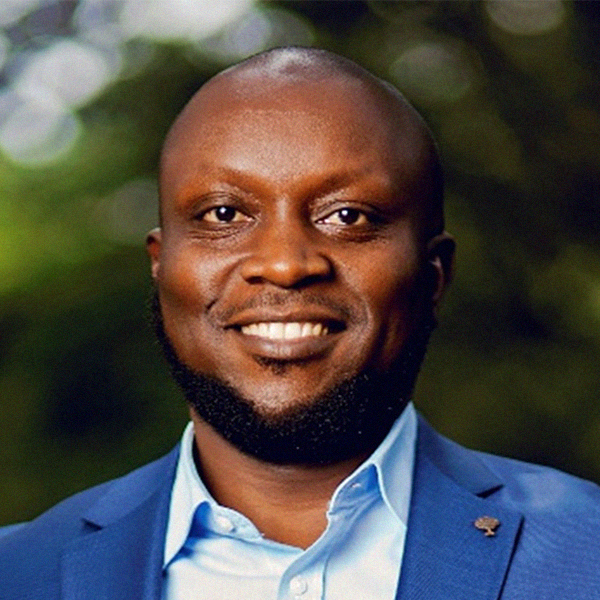
Samuel Ndonga
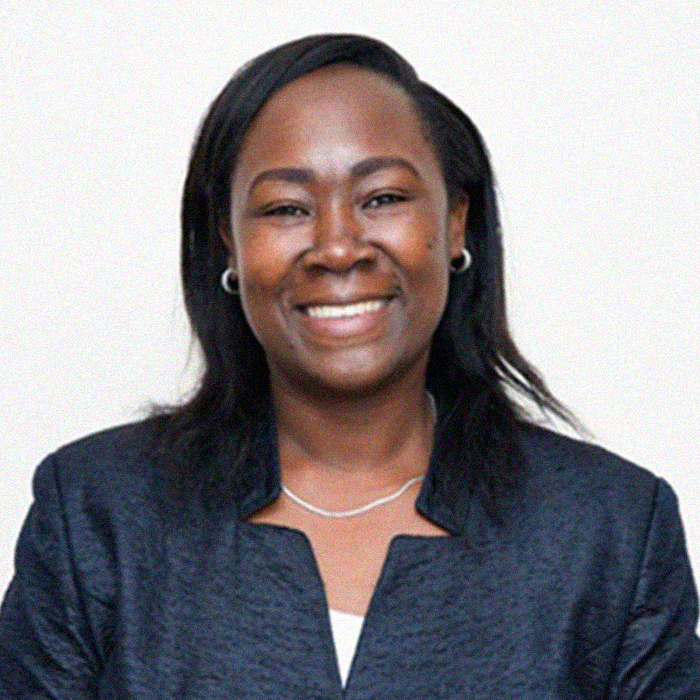
Linda Susan Ingari
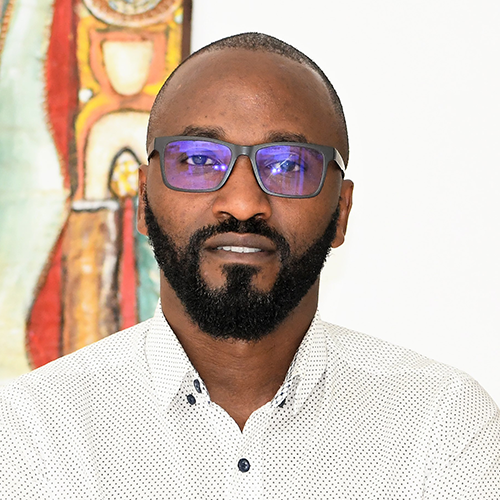
Simon Njuguna-Peter
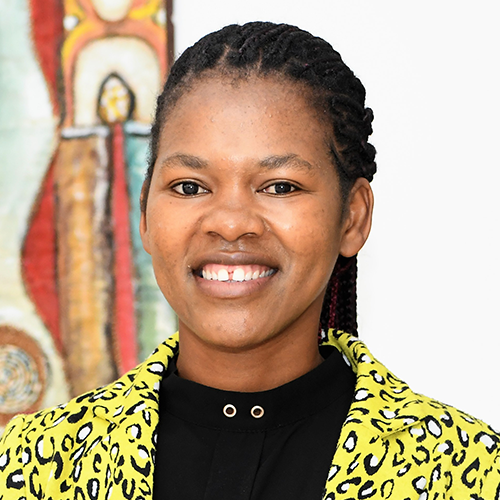
Mary Aming’a
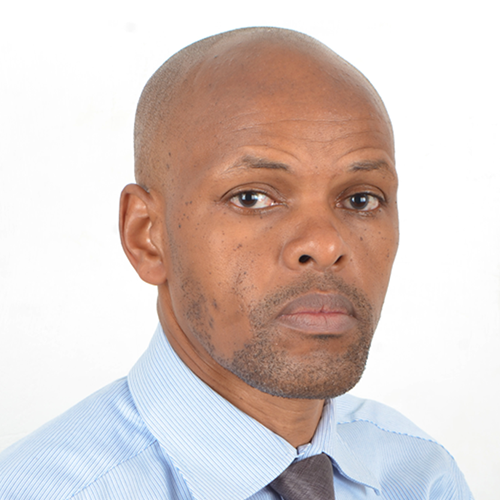

Martin Chege Njenga
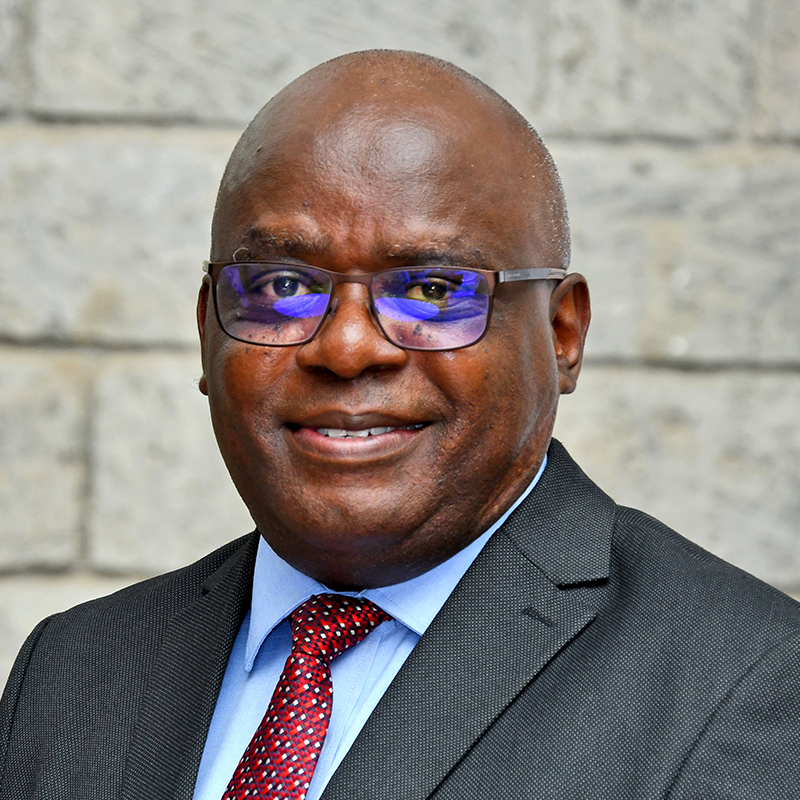
Geoffrey Otieno
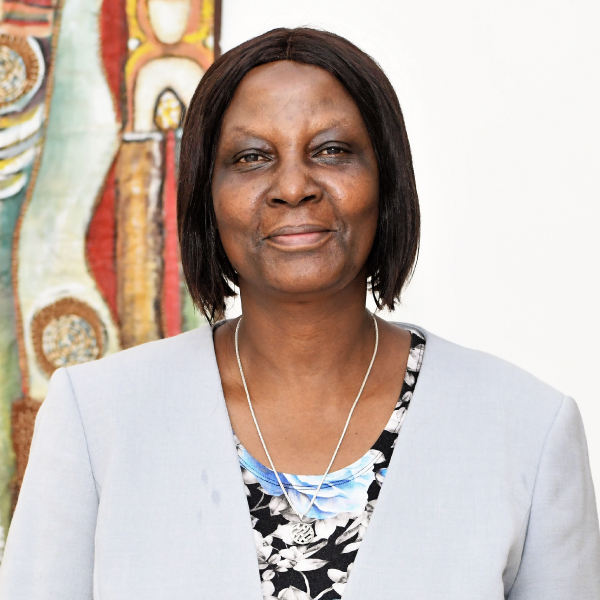
Dr. Mary Omingo
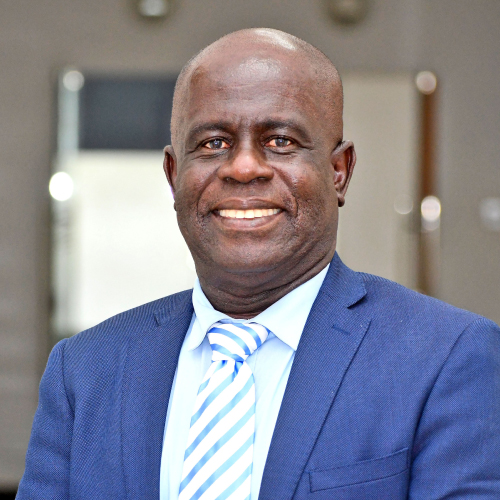
Prof. Jonathan Annan
Felix mogesa.
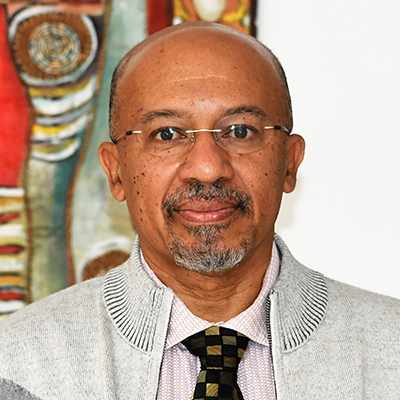
Dr. Majid Twahir
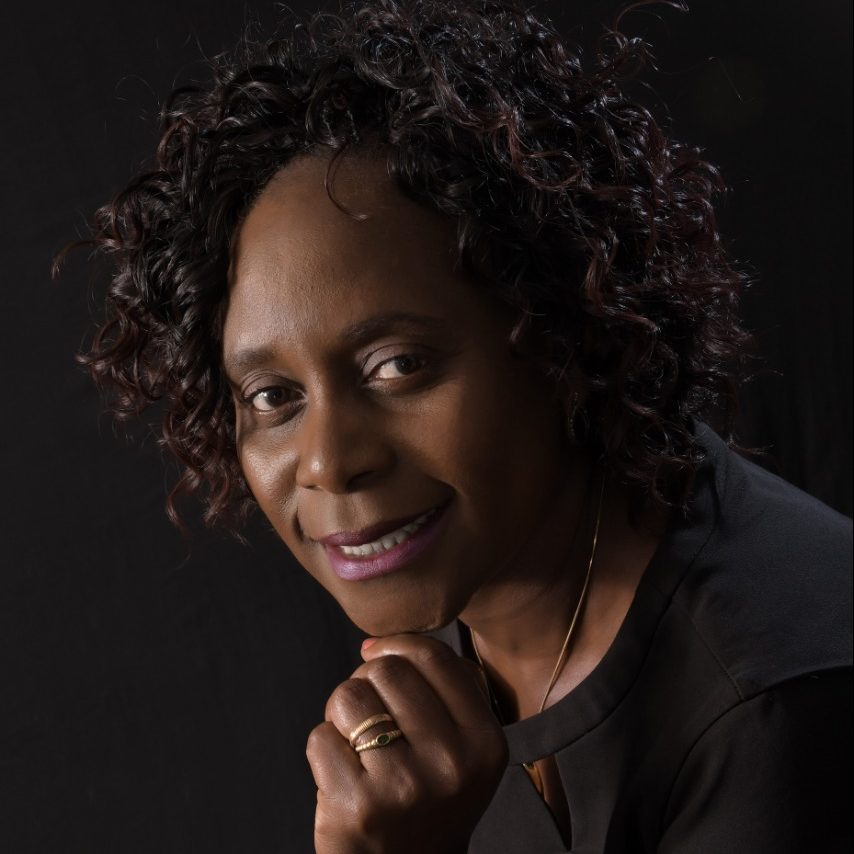
Dr. Olgha Adede
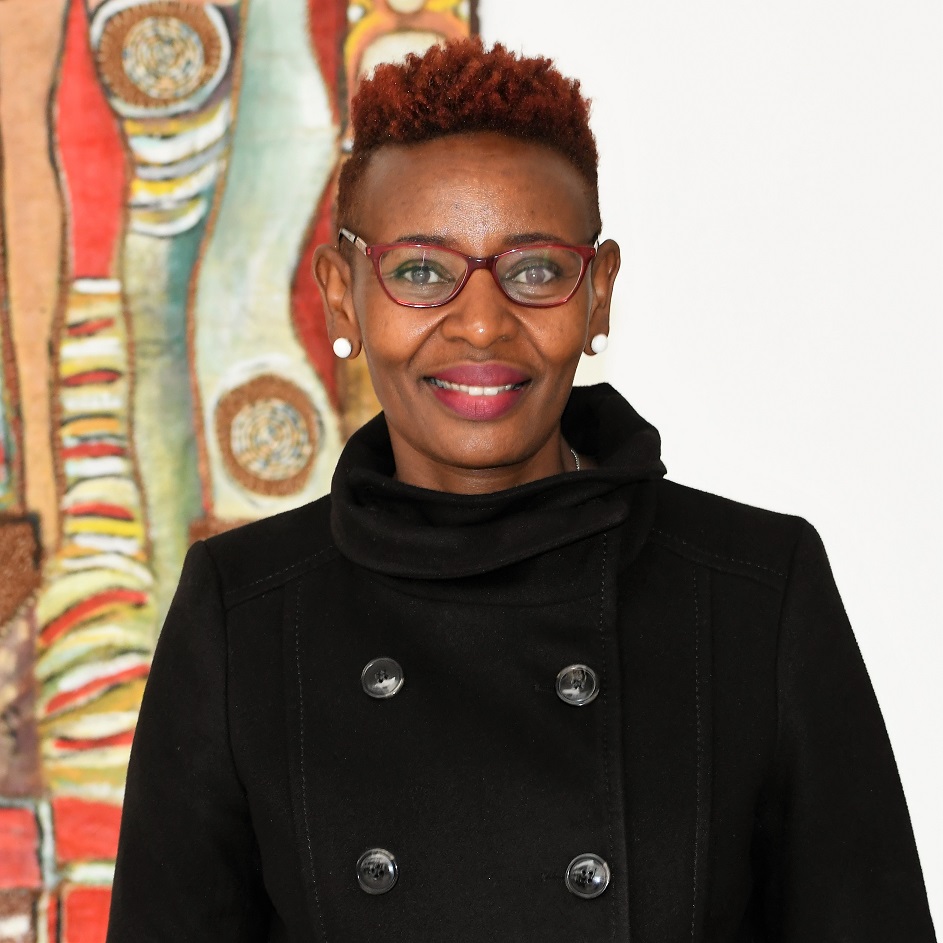
Dr. Irene Ngunjiri
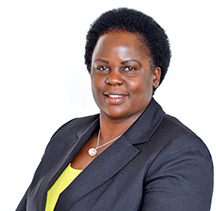
Dr. Bernadette Wanjala
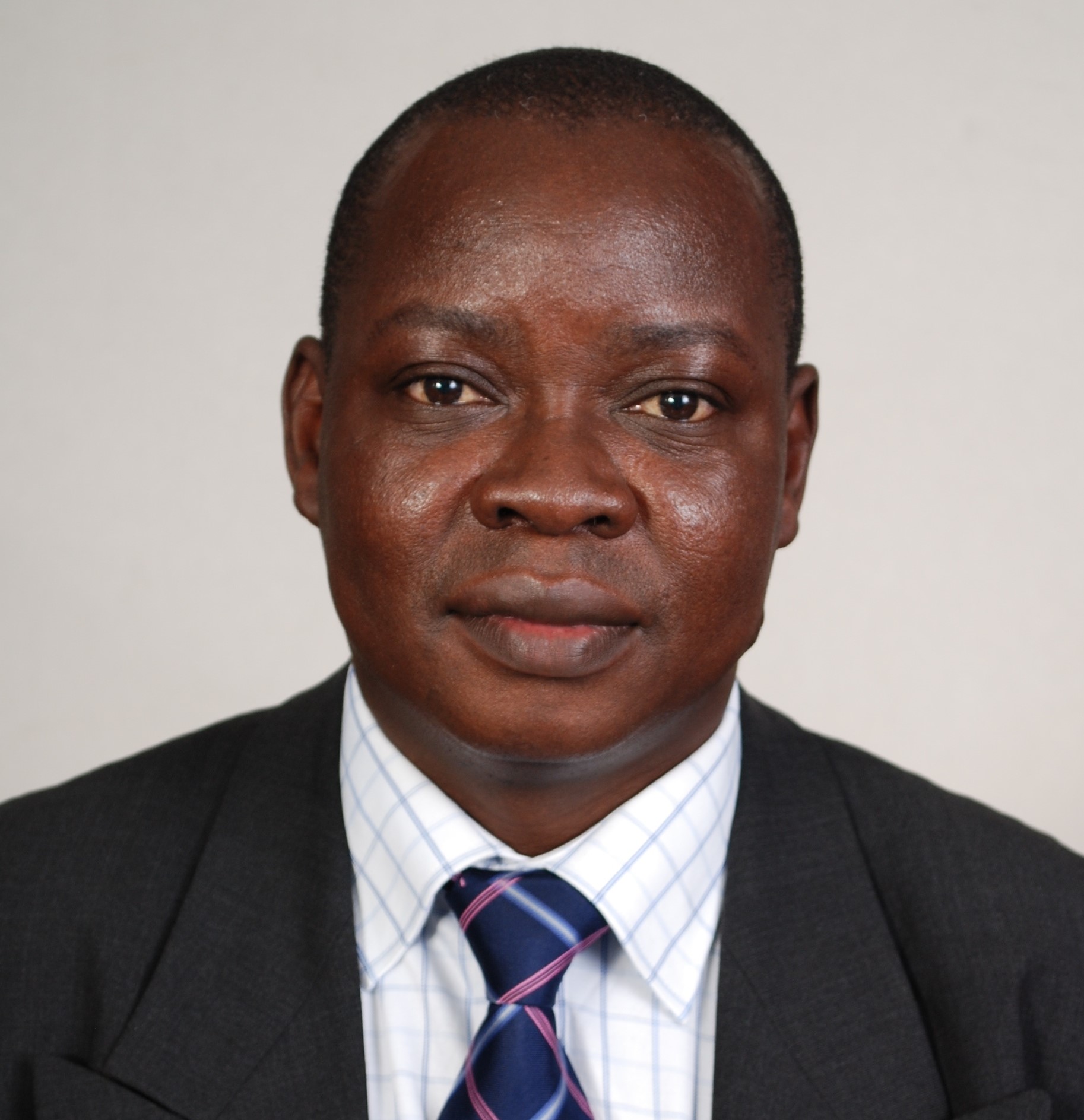
Dr. Wilson Wasike
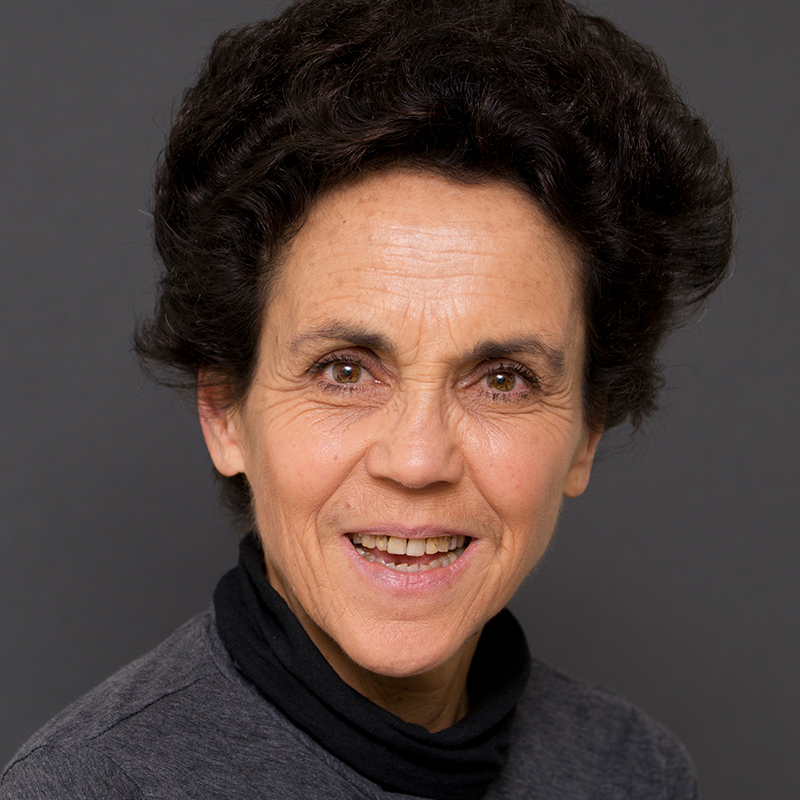
Prof. Lilac Nachum
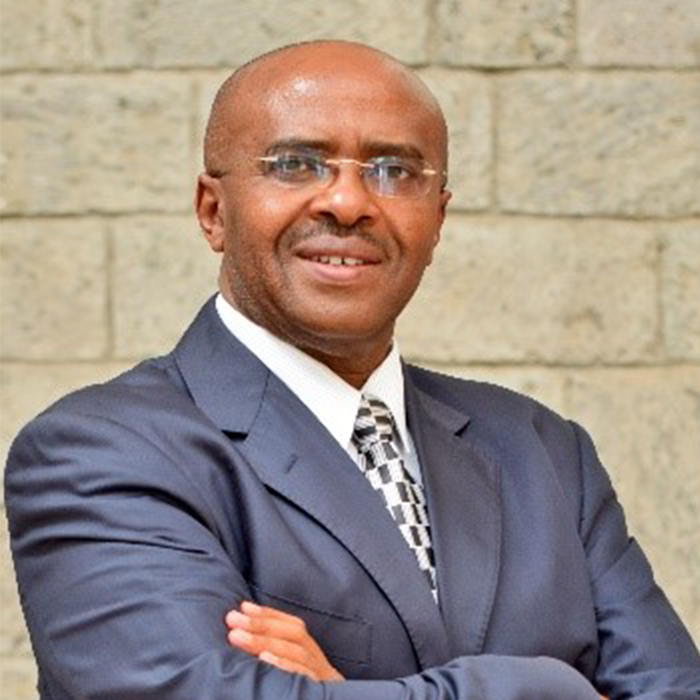
Dr. James Njuguna
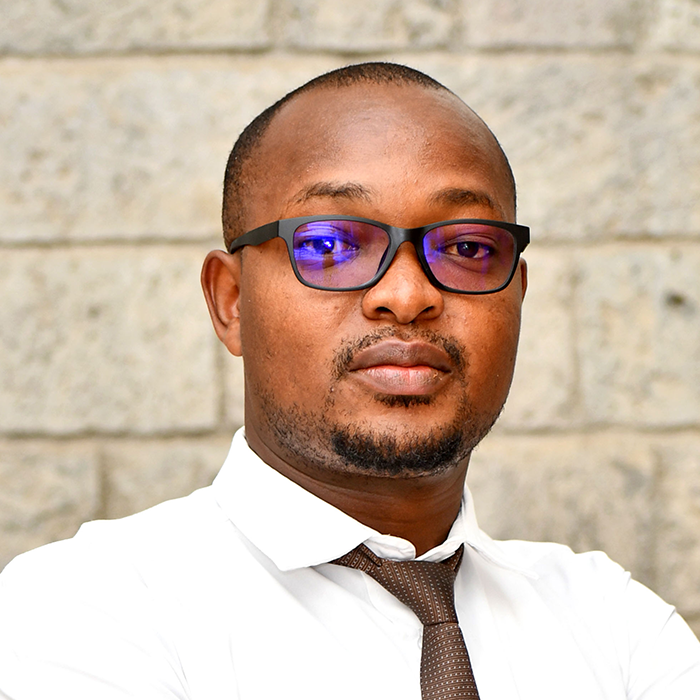
Dr. Erastus Mbithi
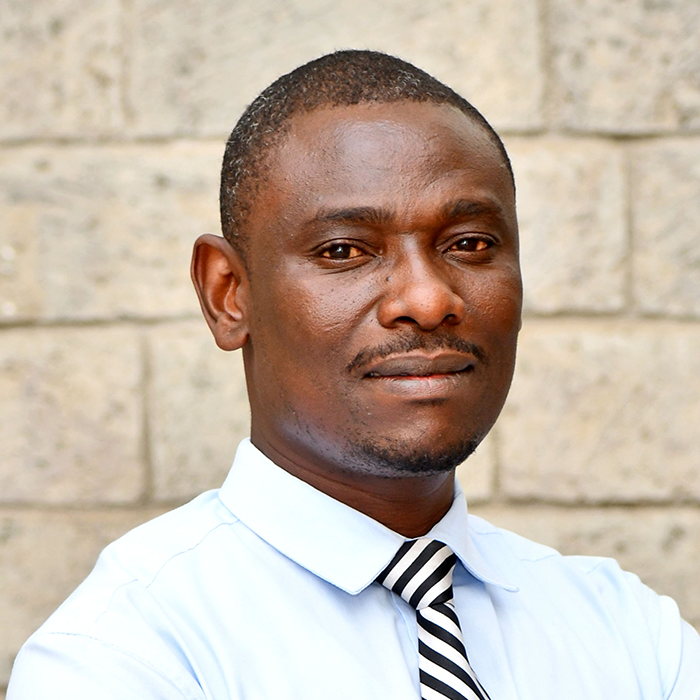
Dr. Albert Ochieng Abang’a
A culture of ethics & learning, sbs partners, information for.
- Future Students
- International Students
- Researchers
- Teachers & Career Advisors
- Parents & Families
- Industry & Community
Useful Links
- Strathmore University
- Student Life
- Request for Coverage
- Privacy Policy
- Corporate Brand Resources
- SBS E-Learning
- SBS Programmes’ Portfolio
- Alumni Network
- Financial Aid
- Programme Calendar
- Alumni Webinars
- Graduation Policy
- Emergencies & Personal Safety
- Provide Feedback
© 2024 Strathmore University Business School. All Rights Reserved.
By Creative VMLY&R
Subscribe to our newsletter
Your journey to business excellence starts here. Subscribe today and be at the forefront of innovation and leadership.
Finance & Tax
- Commerce UG Calendar
- Commerce PG Calendar
- Commerce Whiteboard
- BBusSc specialising in Finance with Accounting
- BBusSc specialising in Finance
- Bachelor of Commerce Honours in Finance
- Bachelor of Commerce Honours in Taxation
- Master of Applied Finance
- MCom in Finance in the field of Corporate Finance and Valuations
- MCom in Finance in the field of Financial Management
- MCom in Finance in the field of Investment Management
- MCom/LLM specialising in International Taxation
- MCom in Taxation in the field of South African Income Tax
- MCom in Risk Management of Financial Markets
- Master of Financial Engineering
PhD In Finance
- Head of Department
- Finance Staff
- Taxation Staff
- Support and Administrative Staff
- AIFMRM Staff
- Student Advisors
CD001 FTX05: PhD in Finance - FTX6000W
About the programme
Who is in charge?
The PhD in Finance programme is convened by Associate Professor Chun-Sung Huang.
Do I qualify?
A suitable degree at the Masters level. Acceptance of the programme is dependent on a research proposal being approved and the availability of a supervisor. Provisional candidates will be required to present the proposal to the Departmental PhD Committee, which will decide whether the student's PhD candidacy can be confirmed. The proposal has to be presented within six (6) months of first registration.
How much will it cost?
For information on fees, please see the Fees Handbook.
How do I apply?
Apply online . PhD applications remain open throughout the year.
Programme start date and overall duration
Once an offer has been made, you can register. International students need to comply with national regulations for visas etc. before they are cleared for registration. Registration with the faculty office is an annual requirement. (You are also liable for fees every year.) You may register from 2 January annually but need not renew your registration at the start of each new academic year (mid-Feb). Your access to funding and physical access to the library and labs, etc., is determined by your registration status. You must follow the directions (from your faculty office) to renew your registration.
The annual registration also requires submitting a Memorandum of Understanding (MoU) which sets out the expectations of both supervisor and student for the year. It is against this that your progress is assessed annually. Unbroken registration must be maintained from the first registration until graduation. If for exceptional circumstances, your studies are interrupted, you may apply for a leave of absence - this is at the faculty’s discretion.
What will I do on the programme?
A PhD thesis must be an original‚ coherent and consistent body of work that reflects the candidate’s own efforts. The thesis may not be more than 80‚000 words. A candidate will undertake research‚ and such advanced study as may be required, under the guidance of a supervisor or supervisors appointed by the Senate.
Paper requirements to graduate
After the research, the candidate shall submit a thesis for examination. This will occur after receiving an indication from the supervisor that the thesis is acceptable for submission. However, a candidate is barred from a submission without the supervisor's approval. The candidate must inform the Doctoral Degrees Board Officer in writing of their intention.
When must I submit it?
31 January to avoid any additional fees. Students must submit their Intention to Submit six weeks before final submission.
For more information on the courses, please refer to Commerce Postgraduate Handbook .
- Executive Education
- Leadership & Management Development
- Management Skills
- Sustainability
- Industry Specific
- Academic Programmes
- MBA Full Time
- MBA Modular
- Executive MBA
- PhD in Business Administration
- PGDIP in Management Practice
- CEMS Master of International Management
- MPhil in Inclusive Innovation
- MCom in Development Finance
- PGDip in Development Finance
- Assessments
- Customised Programmes
- Customisation Design Process
- Customised Programmes Solutions
- Our Corporate Clients
- Customised Study Tours
- Full-time Faculty
- Emeritus Faculty
- Adjunct Faculty
- Research Themes
- Research Ethics
- Publications
- Specialised Centres
- Allan Gray Centre for Values-Based Leadership
- Bertha Centre for Innovation & Entrepreneurship
- Development Finance Centre
- Solution Space
- GSB Library
- GSB Initiatives
- Case Writing Centre
- Power Futures Lab
- Affiliations & Projects
- Centre for Coaching
- Lean Institute Africa
- About the GSB
- Our History
- Our Credentials
- Campus and Locations
- Work for us
- School Leadership
- Management Committee
- Heads of Departments
- The Student Experience
- Career Leadership Centre
- Student Societies
- The Alumni Experience
- Alumni Events
- Alumni Reunion Weekend
- Alumni News
- International Relations
- Student Exchange
- GSB Partner Schools
- Ideas Exchange
- Emerging Market Business
- Entrepreneurship & Innovation
- Leadership & Ethics
- Learning & Development
- Management Fundamentals
- Year in Review Publication
- Newsletter Subscription
MASTER OF COMMERCE IN DEVELOPMENT FINANCE
Building capacity to mobilize & align finance for development and sustainability, learn the processes and strategies for mobilizing and aligning finance for development (f4d).
Mobilizing (sourcing) & aligning (re-structuring) financial resources for sustainability
In response to the challenge of coordinating the roles of multiple stakeholders to bridge the financing gap for sustainable development in emerging economies, the Master of Commerce Degree in Development Finance ( MDevFin ) programme offered by the Development Finance Centre ( DEFIC ) is designed to build capacity on how to design innovative financial instruments and the approaches to incorporating responsible investment strategies in the allocation of funds for impact and sustainability. This is achieved through a blend of traditional lecture sessions with case studies and interaction with professional experts from development finance institutions, public and private sector actors throughout Africa.
The programme provides institutional learning outcomes which will ensure that funds channelled through development projects can provide optimal and sustainable outcomes that can enhance the development of emerging economies. The programme covers 10 courses and 60-credit minor dissertation dedicated to uncovering insights on the ecosystem of development finance covering the role, mechanisms/instruments and impact of various stakeholders involved in mobilization and aligning of finance for sustainability.
* Application & Course fees are provisional for 2025, and are subject to annual UCT council approval. If you would like more information on fees for this programme, click here.
uct gsb MCOM in Development Finance Overview
Learn more about the annual term dates for the UCT GSB MCom in Development Finance programme.
The MCom in Development Finance at the UCT GSB is delivered over a two year period. Explore the programme format and delivery.
Learn more about which attributes and qualifications are required for the UCT GSB MCom in Development Finance.
A step-by-step guide on how to apply for the UCT GSB MCom in Development Finance programme.
The MCom in Development Finance is broken down into four main blocks spreading over a two year cycle comprising nine courses, an elective and a research report.
The UCT GSB is committed to broadening access to postgraduate education through funding and scholarship opportunities. Explore funding options available to MBA candidates.
WHAT OUR ALUMNI SAY
"I chose the programme because I wanted to guide my career towards more impactful work, by using the existing financial institutions to work towards developing communities, and elevating alleviating the scourge of poverty within our continent"
- Sechaba Lengane, MCom in Development Finance student
"The degree has taught us a lot from a theoretical perspective and it has given us the tools to go and implement the agendas and dreams we have for the African continent"
- Siliziwe Mafika, MCom in Development Finance student
"The highlight of the programme was the networking, getting to interact with people from all over Africa and all over the world"
- Robinson Gezimati, MCom in Development Finance alumnus
Influence development trends in emerging markets.
The UCT GSB MCom in Development Finance is the first to reflect development finance activities in the continent
Our MCom in Development Finance will give you the ability to conduct high-level research and engage in the policy decision-making process in development finance institutions, government, NGOs and the private sector.
As your financial skills grow, you will gain a solid understanding of application in the international development context and gain the expertise to start initial investments that can thrive in economically challenging markets and provide sustainable outcomes.
About UCT GSB MCOM in Development Finance
Frequently asked questions, is a mcom in development finance the right programme for me.
As a professional discipline, Development Finance is widely practised today across a broad range of organisations and contexts. However, there is a shortage of development finance experts in Africa, where this kind of knowledge is needed most.
Development finance skills can be useful in providing optimum financial outcomes that enhance the design and implementation of reforms and capacity-building programmes adopted by development finance institutions, governments, the private sector and NGOs.
You don’t need to be working in a development finance institution to benefit from this degree. These skills are also widely used by people in other contexts, including banking and financial services.
Applicants to this programme are typically:
- development finance practitioners
- civil servants
- staff of development finance institutions
- staff of other financial institutions
- entrepreneurs
- staff of NGOs
- employed in the private sector
Does MCom in Development Finance have international accreditation?
Yes! Our MCom in Development Finance, presented through DEFIC, is a partnership programme between the GSB and the Africagrowth Institute (AGI), an independent organisation providing research and consulting on growth opportunities in Africa.
The GSB is one of a small number of universities world-wide offering this degree accredited by the Chartered Institute of Development Finance (CIDEF). CIDEF is a global professional membership and certification body for development finance specialists.
DEFIC is an active member of the CIDEF global development finance network with members from major institutions including the African Development Bank, Development Bank of South Africa, Afreximbank, AERC, Industrial Development Corporation, SADC-DFRC, KPMG and the South African National Treasury, to name just a few.
Click here for more information on DEFIC.
Will this programme help me expand my network?
Yes! The MCom in Development Finance intake often includes up to 60% international students. This provides graduates with a professional network of practitioners in Africa and beyond.
Upon completion of the degree you will become a member of the Chartered Institute of Development Finance.
In addition, you when you graduate you will join the wider GSB alumni network – a dynamic forum that comprises more than 23 000 past GSB students in 68 countries worldwide. Many of the GSB’s alumni hold key positions in top companies or have started their own successful businesses. Alumni play a vital role in supporting and encouraging more recent graduates to follow in their footsteps and GSB students who find employment after graduation – particularly internationally – frequently do so through alumni contacts.

MEET THE PROGRAMME DIRECTOR
PROFESSOR LATIF ALHASSAN
Abdul Latif Alhassan (PhD) is a Professor in Development and Insurance Finance at the Development Finance Centre (DEFIC), UCT GSB. He teaches research methodology and banking and finance in emerging markets courses on the Master of Commerce and Postgraduate Diploma in Development Finance programmes respectively. He is the Head of Minor Dissertation for students during the research year of the programme. Within the UCT GSB, he chairs the Postgraduate Committee (PGC) and is a member of the University Panel on Responsible Investments (UPRI) and the Board for Graduate Studies (BfGS).
UPCOMING EVENTS
Master of commerce degree in development finance (mdevfin) info session.
Join us for an information session webinar about the Master of Commerce degree in Development Finance (MDevFin) at the UCT Graduate School of Business.
IDEAS EXCHANGE
News and thought leadership from Africa’s top business school

Professor Nicholas Biekpe inducted into prestigious UCT College of Fellows
Induction into the UCT College of Fellows is one of the highest accolades an academic staff member can receive. The fellowship is a reward to academic staff members for their years of commitment and dedication to their work.
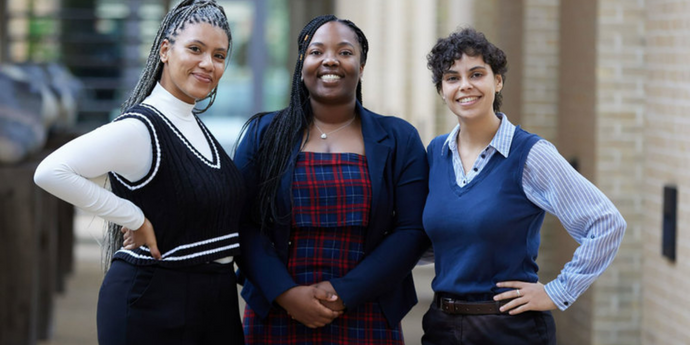
UCT team wins Oxford Map the System competition
Following their win at the regional final hosted by the University of Cape Town Graduate School of Business (UCT GSB), Finclusive was awarded first place for their project at the University of Oxford’s (UO) Map the System (MTS) competition, which took place from 17 to 20 June.
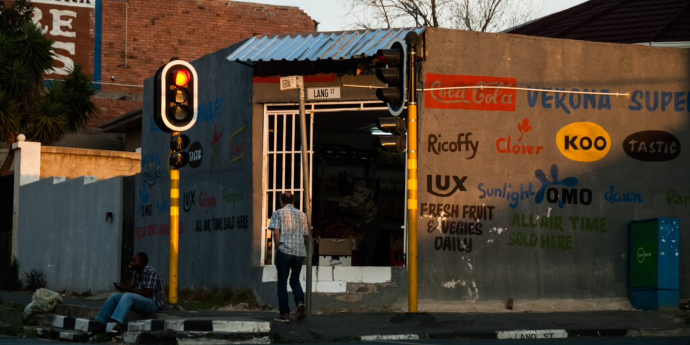
All eyes on DFIs as Africa looks to economic recovery
DFIs can be the catalysts for a stronger and more inclusive continent, but they need to expand their remit to include a focus on SMEs as a key priority.
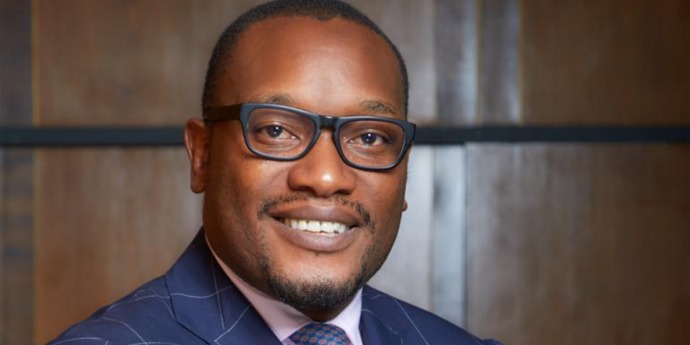
UCT GSB graduate is banking on his country’s future
MCom alumnus, Mutemwa Ushewokunze, has returned to Zimbabwe after 20 years abroad, to help take the country’s banking sector to the next tech level.

The role of development finance in rebuilding South Africa’s economy post-COVID-19
The global COVID-19 pandemic has set back developing countries especially, but it also offers an opportunity to rethink their development path.
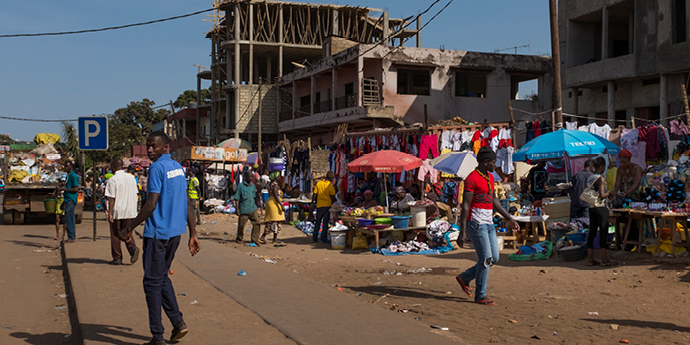
Coronavirus - an excuse to downgrade African countries deep into junk
A number of rating agencies have downgraded emerging market economies during the COVID-19 pandemic. Their actions have raised the question: why do so during a crisis?

Three winning ways to tackle youth unemployment through development finance
Development finance is an underutilised tool that can be directed towards tackling South Africa’s unacceptably high youth unemployment beyond the remit of mainstream finance.
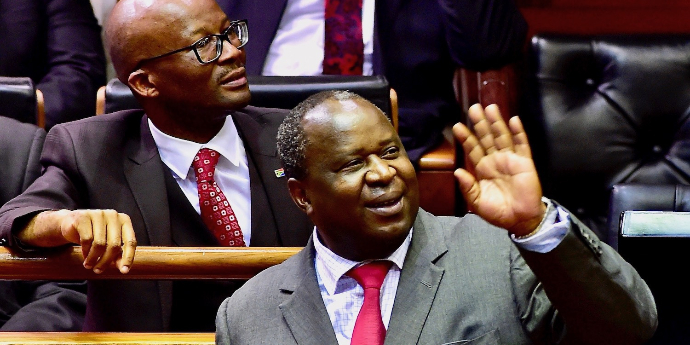
Development Finance Institutions (DFIs) can lead SA’s economic recovery
While government has identified DFIs as a key partner in delivering an economic turnaround — these institutions lack capacity and resources to do their jobs effectively. Fixing this will be a necessity.
Start your application journey here
We’d like to know more about you. Please fill out the form below, to enquire about doing the MCom in Development Finance or to begin the pre-application process.
International and Development Economics
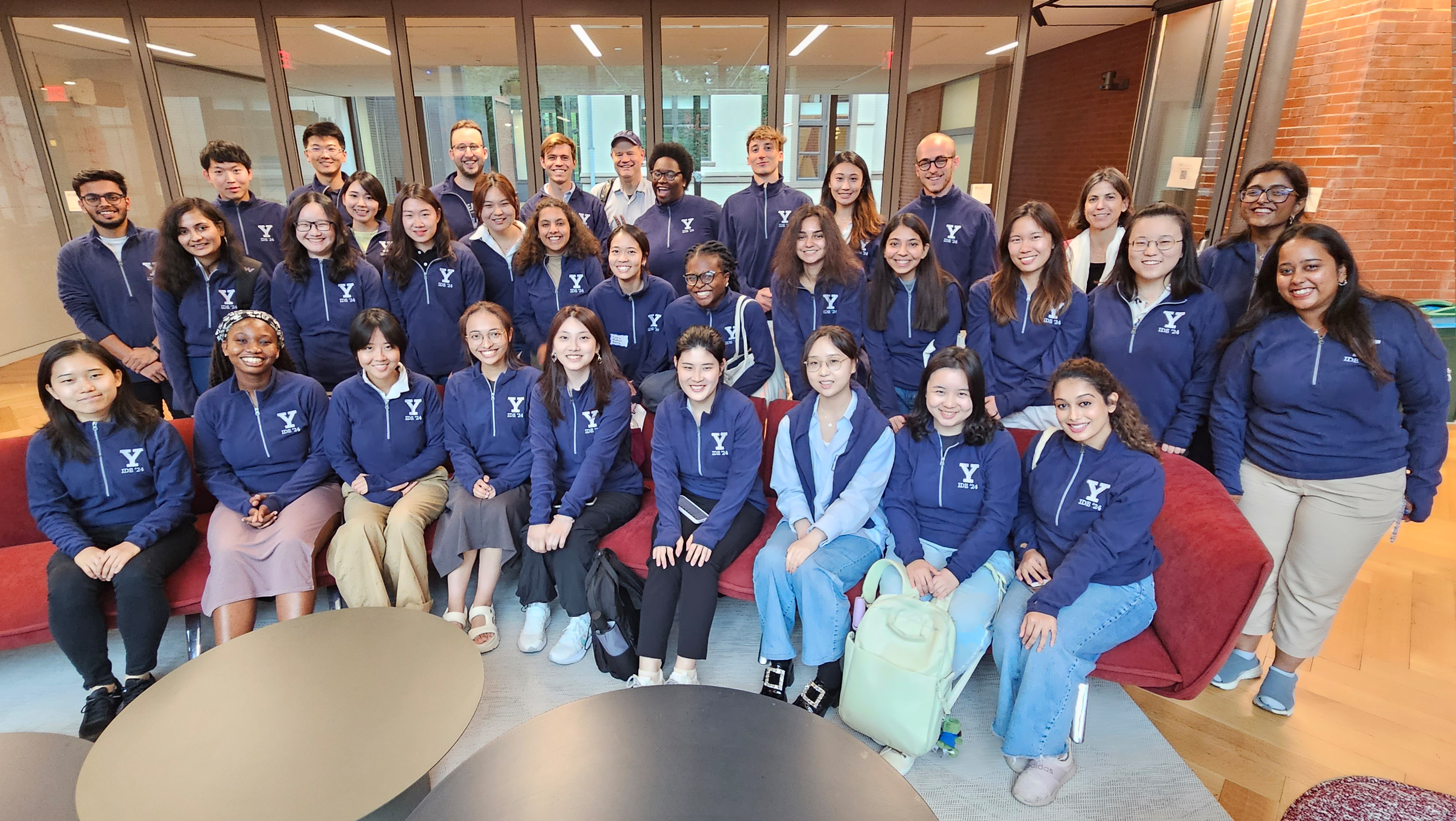
The IDE Program is a one-year Master's program intended to help students build the necessary toolkit for embracing obstacles in their future careers.
The global economic environment has become increasingly complex and poses a myriad of new challenges for policy and data analysts and professionals in all fields.
The ability to respond to rapid changes in this environment requires that leaders have a detailed understanding of the economic forces that affect economic outcomes. Careful economic policy analysis requires practitioners who can make use of the most current theoretical academic literature, as well as do empirical and econometric analysis using the latest approaches and methods.
No longer accepting applications
Visit the GSAS Application site for more information!
- The Program
- Prospective Students
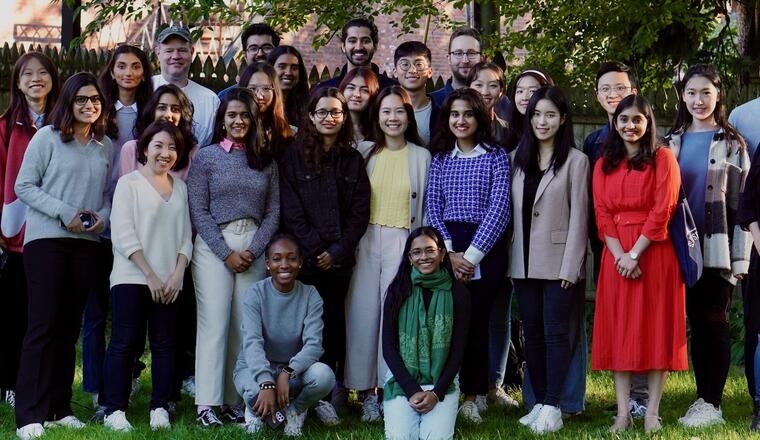
The IDE program at Yale University, housed within the Economic Growth Center (EGC) and the Department of Economics, is a one-year Masters program intended to help students build the necessary toolkit for embracing such obstacles in their future careers, whether as career practitioners and economic analysts or to follow a path through the policy analysis field on their way to subsequent Ph.D. work.
This site is to inform prospective students of the program, the university and life in New Haven. We encourage prospective students to also visit the website of the Yale Graduate School of Arts and Sciences (GSAS) for more information on the application procedure, policies, living in New Haven and other Yale facilities that are all open to IDE Students.
Additionally, this site will provide current students with access to all information they need on a daily basis and the rich alumni network. In the last 65 years, graduates have followed careers in all sectors of work. We encourage current students to reach out to alumni and benefit from their advice.
Office address


Islamic Sustainable Finance: Opportunities for Donors and PAOs to Deliver Sustainable Development Goals
The call for finance to be a ‘force for good’ has reached the forefront, and the islamic finance industry is heeding that call..
Islamic finance is one of the fastest growing areas of the global financial services industry and has even spread into western markets (e.g. Luxembourg ). Islamic finance represents USD 2.5 trillion (DinarStandard, 2019) and is expected to exceed USD 3 trillion by 2020 (Martínez-Solimán, 2017), a portion of which could be mobilized for development. Dr. Mohamed Damak, Senior Director & Global Head of Islamic Finance, reported that S&P Global Ratings indicate that the global Islamic finance industry will expand by approximately 10%-12% between 2021-2022.
The main differences between Islamic finance and conventional finance, is that for the former:
- Sharing of profit is correlated to risk sharing between parties
- Speculation in transactions is prohibited
- Interest is prohibited
- Transactions are asset-based or asset-backed.
Overall, Islamic finance can be an alternative to conventional financial products as a form of socially responsible and/or ethical investing.
Opportunities for Donors
In 2015, the international community adopted the Sustainable Development Goals (‘SDGs’) as a universal call to end poverty, protect the planet and ensure prosperity for all by 2030. Since inclusion, women’s empowerment, accountability, and sustainability are embedded in Islamic Finance’s principles, it offers a natural link with the SDGs.
Islamic finance can ensure that more financial resources are mobilized in a sustainable way for the SDGs, in a way that is more inclusive. Harnessing zakat and waqf flows could be a first step in mobilizing these flows towards the SDGs and towards underfunded humanitarian and development needs.
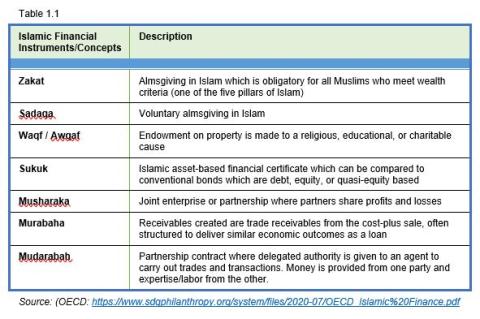
The OECD published a policy paper in June 2020 which identifies opportunities that Islamic finance presents for donors as they look to deliver the SDGs. There are opportunities to expedite the delivery of SDGs through the use of Islamic finance concepts and tools (see table 1.1 for a description of the instruments) . The United Nations Development Programme (UNDP) key findings to date indicate that there are five Islamic financial instruments with high potential – sukuk (bonds), waqf (charitable endowment), zakat (mandatory form of giving) and corporate social responsibilities – which can be combined with microfinance, cryptocurrencies, and other modern mechanisms (sukuk have been using blockchain technology since 2017).
Opportunities for Professional Accountancy Organizations (PAOs)
As the sustainable finance sector grows and becomes more prevalent, PAOs will be at a disadvantage if they don’t participate. PAOs have an opportunity to consider how they can get their members and Islamic banks to be equipped with the right knowledge.
As previously mentioned in the article titled ‘ How Islamic Finance Can Facilitate Public Finance Recovery & Growth ’, PAOs such as the Malaysian Institute of Accountants (MIA), led by the MIA Islamic Finance Committee and the Malaysian Accountancy Research and Education Foundation, are already increasing the supply by attracting, educating, and training accounting professionals versed in Islamic Finance that are able to provide the services needed. The Saudi Organization for Chartered and Professional Accountants (SOCPA) is another example, which is currently developing the next generation of Islamic bankers who understand the dynamics of sustainable finance, who understand climate change, net zero carbon footprint, social finance and inclusion. More PAOs in the region, particularly in the Gulf sub-region and East Asia, are following suit and championing the concepts.
In early 2022, IFAC staff met with representatives from SOCPA—Dr. Musab Al-Jaid, Executive Director of Membership and Professional Qualification; Dr. Musab Al-Naim, Member of the Education and Training Committee; and the Executive Advisor Mr. Abdul Mohsen al-Zaben—to support SOCPA in aligning educational outputs with the labor requirements. SOCPA indicated that it is currently gearing up to launch its model education curriculum for adoption by all Universities in Saudi Arabia to raise the quality of accountancy and finance education, increase the number of qualified graduates, and enable economic sectors to obtain appropriate accounting and auditing services to keep up with the social, economic, and technical developments at the global and regional levels. In its study, SOCPA reports that accounting students in Saudi Arabia already receive training on Islamic finance, and it aims to provide an even higher level of knowledge for accounting graduates by 2030 (Saudi Vision).
Most recently, in response to the market demand, SOCPA included a zakat accounting course on how to prepare a Zakat declaration as well as practical knowledge of zakat legislation and principles. SOCPA also included a course on sustainability and accounting and how to maximize environmental, social, and governance (ESG) performance within the Shari’ah context.
Challenges for Islamic finance in addressing sustainability
Disclosure is likely the main challenge that Islamic financial institutions currently face in fully embracing the sustainability agenda. Only a handful have committed to globally recognized frameworks such as the UN Principles of Responsible Investment and the UN’s Principles of Responsible Banking , both of which require detailed reporting of one’s sustainability efforts and impact. However, the trend toward doing good for the planet is attracting Islamic finance institutions to capitalize on the increasing demand of reaching a wider investor base—which is often the driving reason to turn to Islamic sustainable finance in the first place.
Call to Action
One of our objectives this year will be to engage with relevant PAOs and stakeholders to identify how Islamic finance instruments have been used in various countries towards achieving the SDGs. The purpose is to inform our advocacy and capacity building activities and we anticipate that this work will lead to enhanced dialogue that brings together donors, policymakers, PAOs, and other industry players to unlock investment opportunities for developing countries.
Stay tuned, more to follow!
If you have any examples of how Islamic finance instruments are being used in your country towards achieving SDGs, please contact [email protected] .
DinarStandard (2019), State of the Global Islamic Economy Report 2019/20: Driving the Islamic Economy Revolution 4.0
Martínez-Solimán, M. (2017), Islamic Finance: An Innovative Avenue For Financing The Sustainable Development Goals
OECD (2020), How Islamic Finance Contributes to Achieving the Sustainable Development Goals
S&P Global Ratings (2022), Islamic Finance Outlook: 2022 Edition
Dana Jensen
Senior Manager, IFAC
Dana Jensen is a trilingual Senior Manager with more than 10 years of experience working at IFAC to support the development, adoption, and implementation of high-quality international standards. She is primarily responsible for managing engagement with the Middle East North Africa (MENA) and Caribbean regions at IFAC. She is also the lead staff responsible for managing the IFAC Professional Accountancy Organization (PAO) Development & Advisory Group, which actively contributes to IFACs strategic objectives by raising awareness on PAO development, facilitating adoption and implementation of international standards and best practices, and empowering PAOs with guidance, leadership, and technical assistance. Since 2021, Dana has led IFAC’s Islamic Finance thought leadership program to support the United Nations Sustainable Development Goals (SDGs) as it promotes socially responsible development and links to economic growth and social welfare. Prior to her time at IFAC, Dana was a Policy Coordinator at the United Nations (UN) in the Department for Peacekeeping Operations. She holds an MSc from Columbia University (2011); Prince Sultan University-Banque Saudi Fransi Graduate Fellow in Islamic Finance (2021-2023); and holds a Diploma in Islamic Finance from the Chartered Institute of Management Accountants (CIMA) (2023).
Dana was born in New York to parents that worked at the UN as diplomats. She identifies as a Third Culture Kid with family in Lebanon, Saudi Arabia, Singapore, Turkey, United Arab Emirates, and Yemen. She lived in several countries in the Middle East including Iraq, Jordan, and Lebanon before settling back in New York for University and Graduate level studies in 2004. While currently residing in New York with her husband and kids, Dana continues to travel to the Middle East regularly.
Stathis Gould
Director, Member Engagement and PAIB
Stathis Gould is responsible for IFAC member engagement and leads IFAC’s advocacy for professional accountants working in business (PAIB) and the public sector. A key element of his work is developing thought leadership and guidance in support of enhancing the recognition of and confidence in professional accountants as CFOs, business leaders, and value partners in the context of sustainability/ESG, data and digital transformation, and other emerging business trends and issues.
Before joining IFAC, Stathis worked at the Chartered Institute of Management Accountants (CIMA), where he was responsible for planning and overseeing a program of policy and research that promoted and developed management accountancy. Prior to serving the accountancy profession, he worked in various roles in the private and public sectors in the UK. There, Stathis delivered financial and performance management in the National Health Service and worked for a technology company responsible for delivering the localization of software and content across the globe.
Stathis holds a BA in European Business Studies, an MBA (with distinction), and a postgraduate certificate in Environmental Management, Economics, and Policy. He is a member of the Institute of Management Accountants.
Professor Mohammad Nurunnabi PhD, SFHEA, FRSA, FAIA (Acad), CMBE, CMA, FFA, FIPA, CPA
Professor Mohammad Nurunnabi, PhD, SFHEA, FRSA, FAIA (Acad), CMBE, CMA, FFA, FIPA, CPA is the Aide to the President on Research, Ranking and Internationalization, and Chair of the Department of Accounting at Prince Sultan University, Saudi Arabia. He is an Academic Visitor (Senior Member) of St Antony's College, University of Oxford, Oxford, United Kingdom. Previously he has taught in University of East London, United Kingdom (UK), University of Bedfordshire (UK), and Edge Hill University (UK).
Prior to his academic career, he worked as a financial team member in ADVFN Plc, London, UK. He holds a PhD with an outright pass (no corrections) from the University of Edinburgh, UK. His most recent books are: International Financial Reporting Standards Implementation: A Global Experience (Emerald, UK) and The Role of the State and Accounting Transparency (Routledge: London and New York). He has published over 130 articles in international journals. He currently serves as Editor-in-Chief of PSU Research Review: An International Journal, Emerald, and Series Editor-in-Chief of Contributions to International Accounting.
He serves on the editorial boards over 20 journals. He has received numerous prestigious researches and teaching awards including Prince Sultan University President’s Distinguished Research Award (2020), the IMA Faculty Leadership Award from Institute of Management Accountants (IMA), USA in 2017, ‘Outstanding Research Certificate’ (2015), Certificate of Appreciation on ‘Financial Leadership and Reporting’ from ACCA (2014), Recognition of ‘Outstanding Service as an IMA Campus Advocate’ from Institute of Management Accountants (IMA), USA in 2014, USA and ‘Academic Excellence in Research and Teaching’ Award from Channel S, UK based TV Channel in 2013. He was awarded a Platinum Lever Leader by the Institute of Management Accountants (IMA) in 2019. He has significantly contributed to G20 Saudi Arabia and principal investigators for several policy papers. He is also conducting policy papers with The United Nations Conference on Trade and Development (UNCTAD) and The International Federation of Accountants (IFAC).
He is a regularly invited speaker for international conferences and policy forums. He is also a regulatory reviewer of government regulations on SME in Saudi Arabia. He is one of the founding leaders of the Global SME Policy Network (GSPN). He is contributing to policy issues on Global SME, Tax, IFRS, and Labour Market. He can be contacted at: [email protected]

- Cornell University Home
- College of Agriculture & Life Sciences Home
Communication
PhD Financial Support
All admitted students, including international students, are offered a competitive financial support package that includes tuition , health insurance , and a stipend for five years, including summers..
Continuing support by the program is conditional on satisfactory progress toward completing the degree. The Field typically supports students in the following three ways:
Fellowships
Some students receive research fellowships , funded by Cornell University or external sources, that permit the student to engage in research activities entirely of their choosing, with the support of their Special Committee.
Research Assistantships
Many students are assigned to work with specific faculty members as research assistants on an externally sponsored project. The specific responsibilities of these positions vary, but these often provide an excellent opportunity to work closely with faculty on cutting-edge research and gather data that can be used in published research.
Teaching Assistantships
Many students are assigned to work with faculty on a teaching assistantship . Specific responsibilities vary but often include leading class discussions, assisting with grading and curriculum development, and providing assistance to students. These positions are a great opportunity for building one's teaching portfolio and for getting experience working with students.
Additional Funding
For more information about conference travel grants, research grants, and one-time summer support, please see the Information for Current Students section .

SABS Graduate Development Programme (24- Month Contracts)
Are you a recent graduate eager to kick-start your career? The South African Bureau of Standards (SABS) invites you to apply for our two-year Graduate Development Programme. This is a unique opportunity to gain valuable work experience, receive formal training, and earn a monthly stipend of R8,000.00.
Don’t miss out on this chance to transition smoothly into the professional world!
SABS Graduate Development Programme Overview
- Position : Graduate Development Programme
- Employment Type: Fixed Term Contract -24 Months
- Grade: Non-Graded
- Location: SABS Head Office, Pretoria
- Reporting To: Management
- Closing date : 29 May 2024.
About South African Bureau of Standards (SABS)
The South African Bureau of Standards (SABS) is a leading organization dedicated to promoting quality and standards in South Africa. Their mission is to contribute to the country’s economic growth by ensuring that products and services meet the highest standards of quality, safety, and reliability.
Main Job Purpose
The SABS Graduate Development Programme aims to support unemployed South African graduates by providing them with the skills and experience needed to succeed in their careers. Through a combination of formal training and experiential learning, graduates will be equipped to navigate the challenges of the working environment.
Available Positions under the SABS Graduate Development Programme
1. Certification Services
- Reference: CertificationAdmin
- Number of Positions: 10
- Qualification: National Diploma/Diploma in Office Administration or related field (NQF Level 6)
2. Corporate Services
- Reference: FacilitiesMaintenance
- Number of Positions: 3
- Qualification: National Diploma/Diploma in Mechanical/Electrical Engineering or related field (NQF Level 6)
3. Facilities Maintenance
- Reference: FacilitiesEngOps
- Number of Positions: 2
- Qualification: National Diploma/Diploma in Mechanical, Instrumentation, Electrical Engineering or related field (NQF Level 6)
4. Human Capital
- Number of Positions: 1
- Qualification: National Diploma/Diploma in Labour Relations, Labour Law or related field (NQF Level 6)
- Reference: HCEmployeeRelations
- Qualification: National Diploma/Diploma in Human Resources Development (NQF Level 6)
- Reference: HCHRDMngt
5. Customer Partnering
- Qualification: National Diploma/Diploma in Administration, Business Administration, Customer Relations Management or related field (NQF Level 6)
- Reference: CustEngagement
- Qualification: National Diploma/Diploma in Marketing, Digital Marketing, Social Media and Communications, Public Relations and Journalism or related field (NQF Level 6)
- Reference: CustMarkComms
- Qualification: National Diploma/Diploma in Business Administration, Marketing, Business Management, Commerce, Economics or related field (NQF Level 6)
- Reference: CustSalesBusDev
- Qualification: National Diploma/Diploma in Finance, Accounting or related field (NQF Level 6)
- Reference: Finance
- Qualification: National Diploma/Diploma in Supply Chain Management, Logistics or related field (NQF Level 6)
- Reference: SupplyChainMngt
7. Operations
- Qualification: National Diploma/Diploma in Industrial Engineering or related field (NQF Level 6)
- Reference: COOperations
8. Laboratory Services
- Qualification: National Diploma/Diploma in Chemistry, Civil, Mechanical, Fire Engineering or related field (NQF Level 6)
- Reference: LSDCivilTest
- Qualification: National Diploma/Diploma in Mechanical Engineering or related field (NQF Level 6)
- Reference: LSDMechTest
- Reference: LSDFluidTech
- Reference: LSDSystCert
- Qualification: National Diploma/Diploma in Analytical Chemistry or related field (NQF Level 6)
- Reference: LSDIndusChem
- Number of Positions: 4
- Qualification: National Diploma/Diploma in Analytical Chemistry, Biochemistry or related field (NQF Level 6)
- Reference: LSDFoodHealth
- Qualification: National Diploma/Diploma in Heavy Current or High Power or related field (NQF Level 6)
- Reference: LSDElectroTech
9. Office of the CEO
- Qualification: National Diploma/Diploma in Accounting, Internal Audit or related field (NQF Level 6)
- Reference: InternalAudit
- Qualification: National Diploma/Diploma in Law, Paralegal or related field (NQF Level 6)
- Reference: LegalServices
- Qualification: National Diploma/Diploma in Risk Management, Internal Auditing or related field (NQF Level 6)
- Reference: ComplianceRisks
10. Standards
- Qualification: National Diploma/Diploma in English, Communications or related field (NQF Level 6)
- Reference: StandardProcessSup
- Qualification: National Diploma/Diploma in Architecture, Building Science, Transportation, Mechanical, Civil Engineering or related field (NQF Level 6)
- Reference: StandardsBuildEng
- Qualification: National Diploma/Diploma in Chemical Engineering, Food Technology, Biochemistry or Chemistry or related field (NQF Level 6)
- Reference: StandardNaturalScience
- Qualification: National Diploma/Diploma in Electrical Engineering (Power & Electronics), ICT or Environmental Management or related field (NQF Level 6)
- Reference: StandardsElectroICTSyst
11. ICT & Knowledge Management
- Qualification: Information Systems or Computer Science or IT-related qualification (NQF Level 6)
- Reference: ICTBusApplicatSupport
- Reference: ICTServerAdminSupport
- Reference: ICTServiceDeskAgent
Application Process
To apply for the SABS Graduate Development Programme, please ensure you submit the following documents:
- Certified copies of qualifications/certificates
- Certified copy of driver’s license (where applicable)
- Certified copy of identity document
Related: 5 Strategies to Make Your LinkedIn Profile Stand Out to Recruiters
Applicants with foreign qualifications must submit a SAQA evaluation report of their qualification. Successful candidates will undergo a verification process for their qualifications. Please note that correspondence will be limited to shortlisted applicants only. Failure to submit the required documents will automatically disqualify the applicant.
Why Join the SABS Graduate Development Programme?
Joining the SABS Graduate Development Programme offers numerous benefits:
- Professional Experience: Gain hands-on experience in your field of study.
- Formal Training: Participate in structured training sessions to enhance your skills.
- Mentorship: Receive guidance from experienced professionals.
- Career Growth: Increase your employability and career prospects.
The SABS Graduate Development Programme is an excellent opportunity for graduates to gain valuable work experience, enhance their skills, and prepare for a successful career. If you meet the qualifications and are eager to take the next step in your professional journey, we encourage you to apply.
Related Posts
2024 city of johannesburg eisd student internship, the foschini group yes internships 2024, admissions clerk jobs at the clinix health group (x3 posts).
Type above and press Enter to search. Press Esc to cancel.

Subject Ranking Success
RGU has achieved success with four subjects ranked inside the UK’s top 10 in the Complete University Guide 2025.

You can still apply to RGU
It’s not too late to follow your dreams. Apply to join us this September.
RGU Upskilling Short Courses
Enhance your career prospects or develop your workforce through our online short courses. *Fee-waiver places for Scottish domiciled participants.
Invest in your future
Looking to advance your career, change career direction or pursue a passion? We will have a postgraduate degree that will help you get there.
This is your future. Join RGU
Your next step could be your best yet. This is your future and it starts at RGU. Find out more and apply now:
Study at RGU
We want you to make the most of your time studying with us, however or wherever you study. Studying here is about the atmosphere and feeling like you are part of the RGU community.
Our world-class research reflects our expertise across eleven academic schools. We deliver innovative research solutions for business and industry, and provide economic, societal, environmental and cultural impact.
Business & Innovation
At RGU we support industry, government, non-profits and our wider community of learners directly in applying creativity, ideation, innovation, research, design thinking and entrepreneurship to impact society and business.
International Students
As well as being home to a diverse community of students, our University is recognised for its rankings in graduate employability, industry connections and quality of teaching.
Life at RGU
Boasting plentiful social and cultural activities, Aberdeen offers RGU students a wonderful study, work and leisure environment. On campus, you can take full advantage of first-class facilities as well as our beautiful green open spaces.
Alumni & Supporters
RGU graduates are part of an influential global community of over 80,000 that contribute to the success of the university and its worldwide alumni network.
Latest News and Events
Starts: Monday 05 August 2024
--> A Week in the Life of Art School Geothermal system to be used to cool Kenyan homes Success for students from the Scott Sutherland School at Architecture Awards